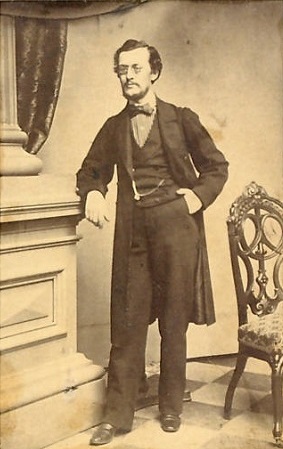
Edward Winter

Frederick M. Edge (see C.N. 9133)
C.N.s 840 and 1358 gave the integral texts of two letters from F.M. Edge to D.W. Fiske, and those complete C.N. items are reproduced below:
C.N. 840:
The following unpublished Edge letter has kindly been supplied by James J. Barrett:
‘This letter was commenced a fortnight back.
59 Great Peter Street, Westminster
London April 3rd – 1859My Dear Fiske:
Having nothing better to do (excuse this flattering commencement) I sit down to take up my pen for the purpose of beginning a lengthy epistle. As Paul Morphy will very shortly be back again in the United States receiving the slobberifications of his countrymen, this communication may be looked upon as an introductory act of transfer, instruction of consignment, etc. etc. Do you remember giving Paul Morphy a note for me when he was leaving New York, together with documents for Preti and others? Well, when we were both in Paris in the month of October last, he asked me to look in his portmanteau for some thick underlinen, as the weather was becoming cool. I searched as directed, and what should I find but these identical notes; and had it not been for my discovery, they would not now have been delivered. I mention the circumstances because I wish you to understand that it was simply and purely de mon propre avis that I stuck to him from the moment of his arrival. Several reasons impelled me to this. Firstly, revenge against the American players who had not recognized my exertions at the Congress. There was only one way in which I would have received any mark of recognition from them; that was by a vote of thanks of which I should have been proud as long as I lived. I don’t care about my duties during the Meeting, altho you are well aware, Fiske, the other secretaries did little or nothing: what I mean is – the publicity which my articles in the Tribune, Frank Leslie’s, etc. gave to the proceedings. Secondly, pride. The English players laughed at me when I told them about Morphy, and the St George’s in particular made merry at me, although I did not allow my enthusiasm to get the better of my judgement. When Paul Morphy arrived he, at first, was distant towards me; he thought, no doubt, I was desirous of being his second and deriving éclat from his feats. I soon set that thought to rest. But the greatest incentive of all was the determination that he should beat Staunton. In the presence of the London Chess Club, Mr Mongredien said to our hero – “You must be very careful, Mr Morphy, what you say and do with regard to Staunton: he is a wily customer and will find means to back out of this match and throw the onus upon you”. I immediately answered right out – “Mr Morphy, Sir, has come to Europe to beat Mr Staunton and he will beat him with whatever weapons that gentleman may choose”. – I have never acted with so much judgement and energy as in seconding Paul Morphy, and in future years I shall always reflect upon this period of my life with pride. Staunton has lorded it over the English chess world for many long years with the utmost tyranny and where is he now? “Not one soul to do him reverence.” He does not go to the St George’s, and all the members of that club are heart and soul for Morphy. Lord Lyttelton’s letter has damned him in history and write or say what he will, he can never resume his position in the teeth of that epistle. Would you think it possible, Fiske, that Morphy objected to have that letter published, and that I was subsequently obliged to send it off to the papers on my own responsibility, without his knowledge? Ah, I have had a bitter, hard battle to fight with him all through. He objected for a long, long time to having the letter sent to Staunton which commenced the public correspondence between them. When S. sought to entrap him by sending his private reply, Morphy preferred listening to anybody but me, and was about answering also privately. But, singly and alone, I managed to carry the day at last, by dint of argument, entreaty and almost tears. And when Staunton published M.’s letter, suppressing that important paragraph, I said that the latter must now address the British Chess Association and claim justice. Morphy laughed in my face, and replied “the matter need go no further”. What would you have thought of him and me if the affair had so rested? I immediately sat down, boiling with rage, and penned the letter to Lord Lyttelton. I took it right away and submitted it to Mr Bryant (Staunton’s old Second) who returned to the hotel with me and induced Morphy to sign it. Nor is this all. When Lord L. sent his capital reply, P.M. declared that it should not be published. – Seeing it was vain to hope for his consent, I waited until he was out of the way and then sent it to the London papers. Ask Morphy if all this is not true, and then say, Fiske, if I did not act as the very best of friends. Still further, am I not the sole cause of his remaining in Europe and beating Anderssen, without which he would have returned to America uncrowned and unacknowledged?
You have, by this time, read my book. Have I sought my own glory or avenged myself for any supposed wrong? Private feelings have nothing to do with my admiration for his genius; and besides, there is a sweet satisfaction in working heart and soul for a man who is unjust and ungrateful to you. Fiske, how Christian-like one feels when his motives are misjudged and his disinterested acts supposed to cover an arrière pensée, and this is just my position. Through chess in New York and working for your Congress, I lost a good situation on the Herald. Through Morphy I lost an autumnal tour in Russia, the confidence of my father, the affection of my family; nearly broke my poor wife’s heart by forsaking her for him, and to cap the climax am now hated and maligned by himself. And now, how stands the case? I see him safely out of Europe with the greatest reputation that ever chessplayer possessed, and I write a work which will live as long as the game lives and will make him more famous than anything he has ever done. And all for what? To be treated as Alexander served Parmenio.
The main reason for Morphy’s treatment is this: You know that any laborer in the South is regarded as a slave: he has come so to think of me. I made the proposition to him to accompany him to Paris as his secretary, etc., if he would pay my expenses, which I would pay at some future day. He ultimately got to think me a nigger, actually telling me one day, “you will write, you must write, you are paid to write”. No other man but myself would have forgiven him that. I did for he had not yet beaten Anderssen and I was resolved he should. And now that he is at home, I shall still guard his fame here in Europe and woe be to him who dares say aught against Paul Morphy.
In anything I do for Morphy, I am admirably seconded by Löwenthal who downright worships him. I am writing to you Fiske, purely confidentially, and will therefore tell you a secret, which for Heaven’s sake keep to yourself. Staunton has got himself into such bad odour with his countrymen that there is but one club throughout the length and breadth of the kingdom which is favorable to him – viz, the Cambridge University C.C. S. wants to right himself. He cannot get any games for the Ill. Lon. News except those he copies second hand from other papers, and he does not show himself anywhere in chess circles. Besides, he knows that the British Association must, at its next meeting, take action upon Morphy’s appeal to its President, and he is now working to get the meeting held at Cambridge. Löwenthal and I are watching him and we have discovered that he is endeavouring to induce the Worcester Club to give up its claims until next year and it is probable they will. We shall then get the meeting in London and Staunton will be outvoted 20 to 1. Löwenthal is very popular with all the London clubs, and I have now some influence with the leading members and shall have much more when my book is published. Besides, Walker, Boden and Falkbeer are under obligations to me and I can use their columns when I wish. Depend upon it, Staunton won’t make anything by Morphy’s departure, and wherever the association may meet, I shall be present and face to face with the portly Howard. He has been no match for me in diplomacy and correspondence and he will be still less in speechifying.
April 15th 1859 –
Morphy leaves for Liverpool today on his way to New York. Before you receive this, you will have seen him and no doubt will have heard his reasons for so acting towards me. Now Fiske, I ask you, what reasons have I, or had I, for sticking to him? I was no chessplayer or American. I could hope to gain nothing by friendship for him. I do not wish to prejudice you against Morphy: if one must suffer, let it be me, for he is your countryman, your co-editor and your friend. All I ask of you is – do not wrong me also. I have done him nought but good, I have served him as a Christian should his God. Judge me by my conduct since his arrival in New York in ’57 – and as I love and esteem you Fiske, show me some generosity – which I have not received from your countrymen. Morphy is gone. I must now devote my years to business. My father’s affairs call me constantly into the different great cities of Europe. I shall make a point of visiting the chess clubs in my journeyings and you may rely upon receiving occasional readable articles from me for the Monthly.
Hoping you are well and that you will receive Morphy as he really ought to be received for the glory he has cast upon his country.
I remain, my dear Fiske,
Most Sincerely Yours
Fred’k Edge
P.S. – You ought to have the announcement of Morphy’s being on board in the Extras. I wrote to the Captain of the steamer to ask him to do so.’
C.N. 1358:
The Morphy entry in the Oxford Companion to Chess (page 217) caused a considerable stir by quoting from an unpublished Edge letter: ‘I have been a lover, a brother, a mother to you; I have made you an idol, a god ...’ For a long time it proved impossible for us to secure a copy of the letter but now, thanks to Frank Skoff (who obtained it from a source insisting upon anonymity), the complete text can be made public here. The first thing to note is that, contrary to the impression given by the Companion, the letter is not addressed to Morphy himself, but to Fiske.
‘59 Great Peter Street, Westminster
London S.W.
March 25th 1859My Dear Fiske,
Many thanks to you for your kindness in forwarding me the “Tribune Almanacs” with such promptitude, and I must, at the same time, assure you that I shall find out some means of proving my gratitude to you for the regularity with which the “Monthly” has arrived, though unasked by me. You must put down my name as a paying subscriber, since the commencement of this year, and I will take an early opportunity of handing you the subscription, postage included.
Now, about my “Morphy Book”. Appleton has made arrangements with me to publish it, and I am now writing the last two chapters. Next Saturday’s mail carries the manuscript to him. He has given orders here to his agent, to let me have my own ideas carried out with respect to illustrations; and the first Engraver in England, Dalziel, has, for some weeks past, been engaged on plates for the book. No. 1 is Morphy, No. 2, a group – Staunton, Boden & Löwenthal. No. 3, Lewis, Walker & Mongredien. No. 4, Anderssen, Harrwitz & Saint Amant. I have obtained Photographs of all these men, and you may rely upon seeing true likenesses, as Dalziel is not limited to expenses.
I am going to make a request to Appleton, that he engage you to revise the proof-sheets, in order that there may be no mistakes in the spelling of proper names. He will, of course, remunerate you for the time so expended, and I think you will not object to the labor, inasmuch as you will have the first sight of the book. But I ask you “as you love me” not to alter any of the matter, or cut out anything: What I have written, I have written and wish to remain – at all events until the second edition. –– The book contains between 200 and 250 Pages, the size of Bohn’s Handbook (Staunton’s) and will be dedicated to the American Chess Association; and I feel confident will put Morphy on such a pinnacle of fame, as he himself never dreamed of. Löwenthal has roared over the different chapters I have read to him, and says that all the chess tales he ever read are nonsense to it; and I believe you will think so too. This is a synopsis of the contents.
Paul Morphy’s
Travels and Triumph
In Europe.
1. Morphy becomes acquainted with his Parents and Countrymen.
2. The First Am. Chess Congress.
3. Morphy prepares to start for Europe.
4. Chess in England from the Year One
5. Morphy in England.
6 How the great English Champion,
7 Howard Staunton, very much
wanted to play Paul Morphy, and
wouldn’t after all.
7 Morphy in France.
8. 9. 10. 11. Morphy & Harrwitz. – all of
the Amateurs of the Régence. – Morphy in Society. – Morphy and
Anderssen, etc. etc. etc. etc. etc. etc. etc. etc.In the 4th chapter, I give matter never before published, derived viva voce from George Walker, Lewis, Medley etc. on the old Philidor Club, Parsloe’s, the Divan, Westminster, St George’s, London, etc. The chap. is about 40 pages long, and will be interesting to the chess community at large. – I give all the correspondence, anonymous and otherwise, about Staunton, and particulars only known to Morphy and myself; and the work is chock full of anecdotes throughout, and, as I have already told you, written for everybody, not for mere chess players. –– I write in the first person but will not affix my name, because I wish Morphy alone to have the glory of his own acts. This has been a rule with me since his arrival in Europe, and though fiercely pressed even by ladies to sit for a photograph with him, I have always refused for I will not have it said that I had any personal motive in sticking by him. My real motives are these: I was deeply hurt at the Congress at not having my services recognized. You know how I worked, in the rooms and in the papers; why I know not, and I certainly did look for a vote of thanks. Well, when Morphy came to England, I said – “Now I’ll be avenged, but I’ll stick by this fellow-countryman of theirs, and I’ll make Americans blush for their slights”. – Now, Fiske, I can from the depths of my soul declare, looking God in the face, that had it not been for me, you wouldn’t have seen 20 of Morphy’s games – the correspondence with Staunton wouldn’t have been written, and Morphy would have gone back humbugged and a laughing stock. I made him stay and play Anderssen, and I have stood invariably between him and his enemies; and conspiracies have been dangerous in Paris, I assure you – in the salons – by Morphy’s own fault. I can say, never did man more devotedly serve another. I neglected my wife for him, accompanied him to Paris and left her till broken-hearted she came to fetch me back. I put a coldness between myself and all my family which only years will heal, and I don’t, even now, know why. I am not a chessplayer, I am not an American, I have nothing to hope for from Morphy, and I would not say what I have herein written, to anybody but you, and you will be guilty of an infamous act if you let anyone see this letter.
I shall watch over Morphy until he leaves Europe, and when he leaves I can say – “What you are outside of chess, I have made you. Your tremendous laziness, but for me, would have obliterated all your acts. I have taken your hundreds of letters out of your pockets even, and answered them, because you would have made every man your enemy by not replying. I made you stay and play Anderssen, when you wanted to leave. I nursed you when ill, carrying you in my arms like a child. I have been a lover, a brother, a mother to you; I have made you an idol, a god – and now that you are gone, I never –– but I will not finish. I say this to you, Fiske, but I have said nothing of it in my book; there Morphy is all in all, the Alpha and Omega, the beginning and the end; all that is great, magnanimous, true, noble and sublime, and Morphy will not open its pages without a blush, or close them without a sigh. – Burn this letter, Fiske, and forget the contents. – Yrs. very truly
Fred’k Edge
P.S. I shall be happy if you announce my book in the Monthly, and, when published, give me a critique. It will be well advertised, and I hope Ripley will give me a good notice in the Tribune. Can’t you get him to? Bring the Enclycopedia to bear.’
We have tried to follow Edge’s exact spelling and punctuation (which includes ‘Enclycopedia’ and the two 7s in the list in paragraph 3). In the final paragraph before the signature, Edge does not close the quotation marks (which should presumably be done after ‘I never ––’).
On page 116 of his book Lawson quoted three sentences from the letter (‘I can say ... – ... only years will heal’).
In neither the New York nor the London edition of Edge’s book is there an acknowledgement to Fiske for proof-reading.
Addition on 24 August 2013: Prior to submitting the first of the above letters, James J. Barrett (Buffalo, NY, USA) wrote to us on 27 June 1984:
‘I have been waiting to see possible responses to C.N. 630 about Morphy and Edge, and since there are none so far I will fill in the gap with a text of a letter Edge sent to Fiske which I think will shed some light. Lawson suppressed this letter, despite my importunate pleadings, because he seemed to think it put Morphy in an unfavorable light. I have reason to believe there were other Edge letters which were not used for the same reason.’
C.N. 630 had consisted of this brief question:
Information wanted: how, when and why did Morphy and Edge fall out?
We present the full text of a third letter from F.M. Edge to D.W. Fiske. Edge discusses his relationship with Morphy, with whom he had fallen out, and shows himself still aggrieved over the unenthusiastic reception given by Fiske’s magazine, the Chess Monthly, to his book on Morphy (see pages 247-248 of A Chess Omnibus). However, Edge praises Fiske’s volume on the New York, 1857 tournament, which had just been published.
‘151 Cambridge St. Pimlico. London (S.W.)
7 November 1859Dear Fiske,
I have just received my copy of the Book of the Congress, and desire to thank you for the reference you make to me in the Preface. The notice of my book on page 500 is “altogether curious”. You seem conscience-pricked for the damning critique in the Monthly, and, taking the book out of hell, put it in purgatory. Your dough is now mixed with a little less of the “leaven of unrighteousness”, but, still, this “little leaven leaveneth the whole lump”.
When Morphy revisited London, he made the English players cognizant of our falling-out. Of course these parties would necessarily side with the hero against poor me, and I was not going to defend myself for then I should have had to break down what I had labored for months to build up. One day, I met Boden, who, to my astonishment, shook me by the hand as warmly as ever. “What!”, said I, “haven’t you seen Morphy?”. “Ah yes,” he replied, “several times, but why?” “Because he can’t have said anything to you.” “Ah!”, says Boden, “I see what you mean. I have heard a good deal, but all I know is, I have received nothing but kindness from you, and whatever is said goes in at one ear and out of the other.” Now Fiske, I need not tell you of the obligations under which all chessplayers, and especially all American chessplayers, are to me; and, if from no nobler motive, at all events from self-respect, you ought not to have made yourself a partisan against me. Look at your own words on page 316 of the no. for October 1858.
When I read that cruel notice in the Monthly I sent you a communication which, in the heat of offended pride, I threatened to publish as a vindication of myself. Cooler judgment has shown me that it is nobler to suffer. Besides, I do not envy your feelings, and, above all, do I not envy Morphy’s. His southern pride may, for the moment, overpower generosity, but conscience must, sooner or later, torture him for returning malevolence for kindness. When flatterers cease to charm him, he will come to one who never flattered; and he will form a low opinion of those who abetted him against one who, in spite of any former difference, proved himself one of the best, if not the best, friend he ever had.
History neither lies nor forgets. Nobody could chronicle Paul Morphy’s feats in future ages without giving me my due. All French and English players know this, and the Germans, too, through Anderssen and Mayet. Besides, I shall at some future time through my own individual exertions reflect glory upon Morphy, and what I say will be received as authoritative. It will not always be “Edge, Morphy’s friend”, but “Morphy, Edge’s”. Voltaire was enthroned by Frederick of Prussia; he was Voltaire nevertheless, but Frederick crowned him. Mark my words, Fiske! If not a Virgil in chess, I shall one day be its Maecenas. This only requires these qualifications - energy, wealth, power. The first you know I possess, and the others will be shortly mine. Then, all of you will come and make your peace with me.
I requested the Appletons to hand you a number of copies of my book for the principal members of the Congress. I have never received any acknowledgment from one of them. Can you explain this to me, Fiske? I do hope you will answer this letter and tell whether they are all silent intentionally, and why. Will you find time to write a few lines in return for all the notes I have sent you during so many months?
Staunton is again at his old, dirty tricks. See last no. of Ill. Lon. News. I am writing a small bit of my mind to Bell’s Life on the subject.
Trusting to hear from you shortly,
I remain,
Dear Fiske,
Yours very truly,Fred. Edge.
D.W. Fiske, Esq.
P.S. 10 November 1859
I have got through the Book of the C. and am astonished at the vast amount of information it contains. There seems to be nothing omitted which could be contained in such a book. Three years instead of two would not have been too much for it.
The English papers reviewed it in high terms.
F.E.’
The reference to page 500 of the New York, 1857 tournament book concerns a brief notice of Edge’s volume on Morphy:
‘A gossiping account of the career of Morphy in Europe. Some portion might, perhaps, have been omitted or re-written, but, upon the whole, it is not an uninteresting volume. The author’s name is Frederick Milne Edge.’
(3396)
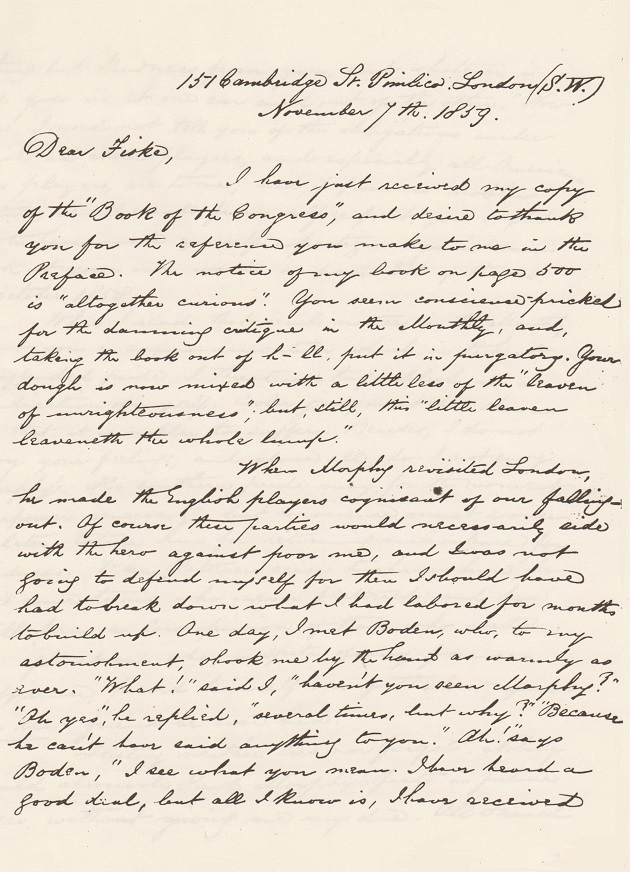
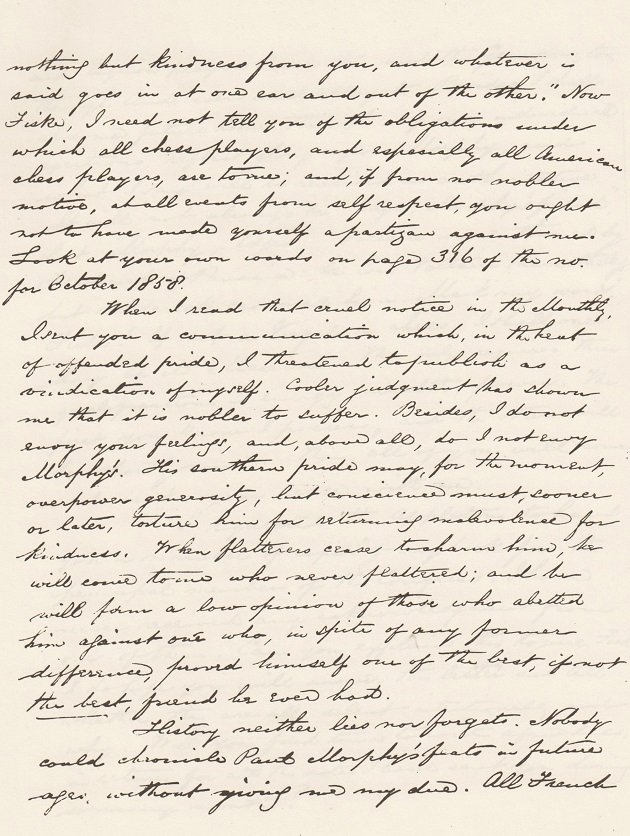
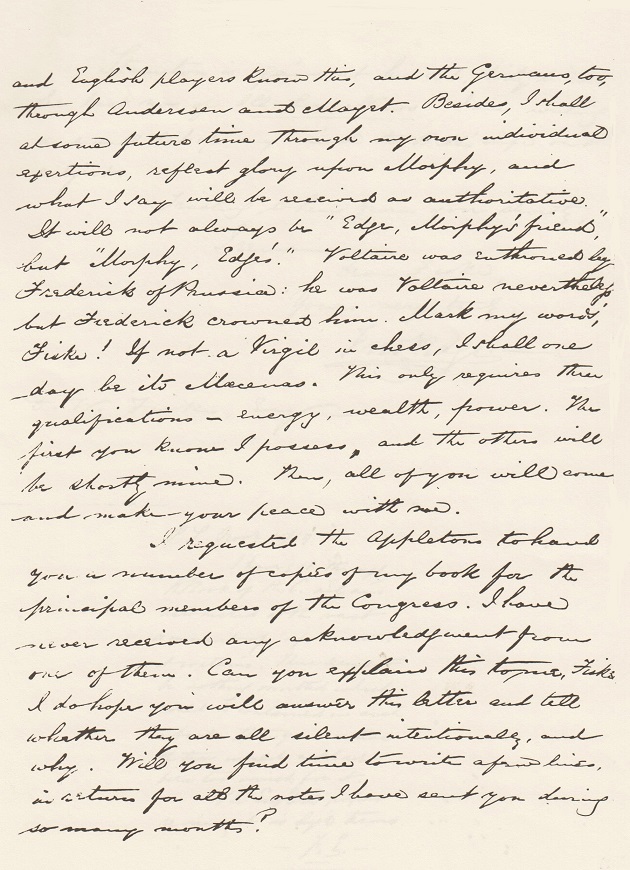
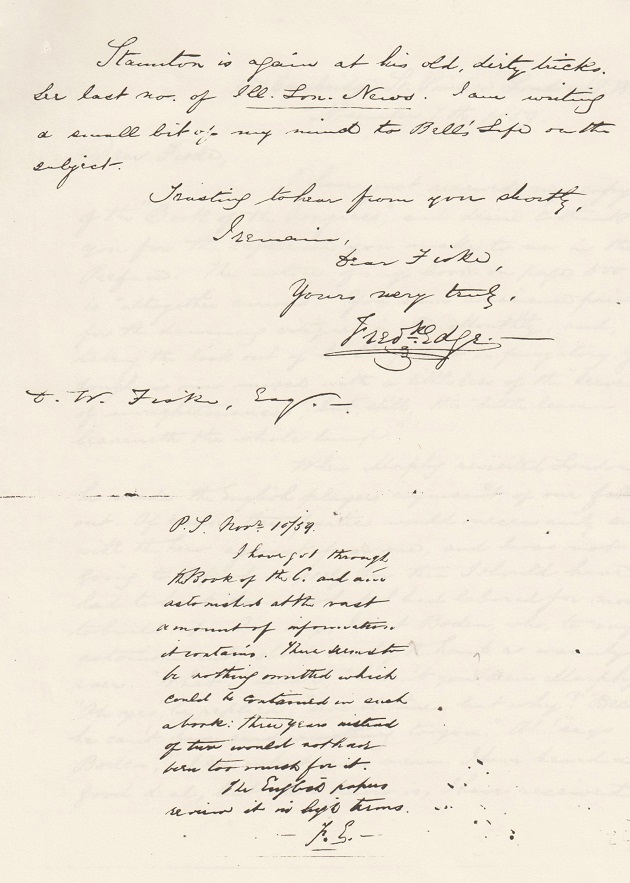
A transcription of this letter, together with information about the context, was given in C.N. 3396 (see above).
Concerning Edge’s assertion, at the top of the fourth page, that in the most recent edition of the Illustrated London News ‘Staunton is again at his old, dirty tricks’, below is the start of the 5 November 1859 column, page 452:
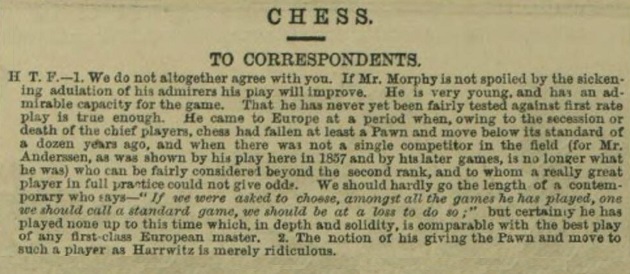
In the late 1980s Frank Skoff sent us a ‘list of letters (plus some other items)’ in David Lawson’s book on Morphy:

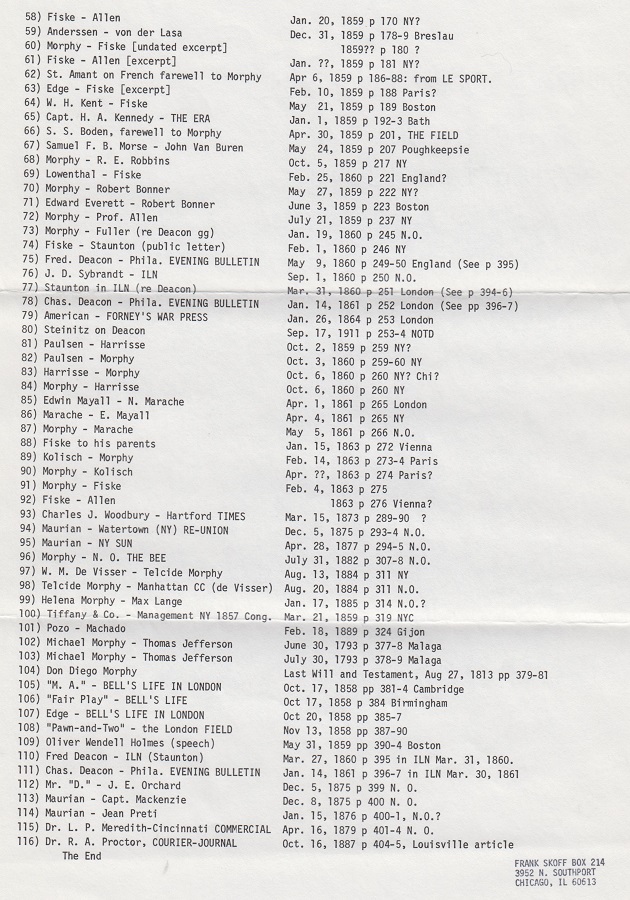
(10294)
There follows another letter, of which we acquired a copy from Dale Brandreth (Yorklyn, DE, USA), who had obtained much archive material from David Lawson:
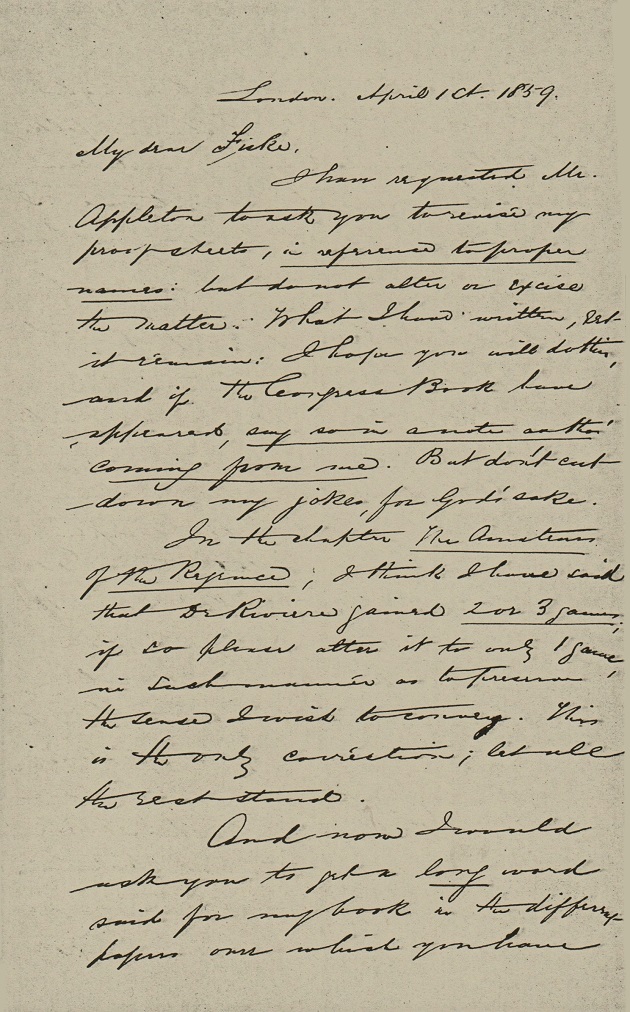
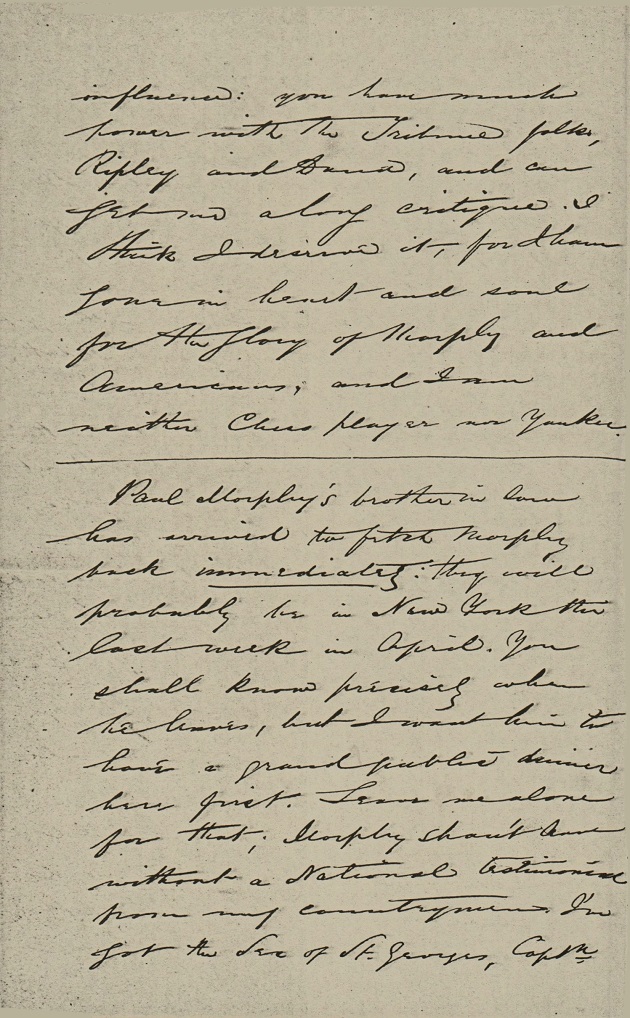
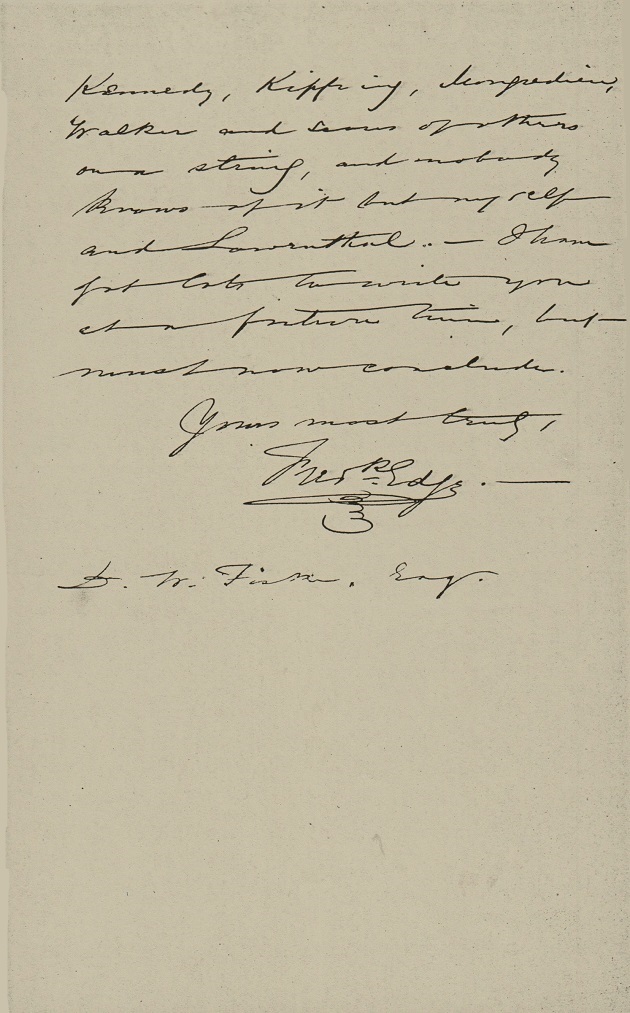
It is intended that other letters will be added to our Edge-Fiske feature article in due course.
(11784)
The series of letters from F.M. Edge to D.W. Fiske continues with the following, dated 30 August 1858:
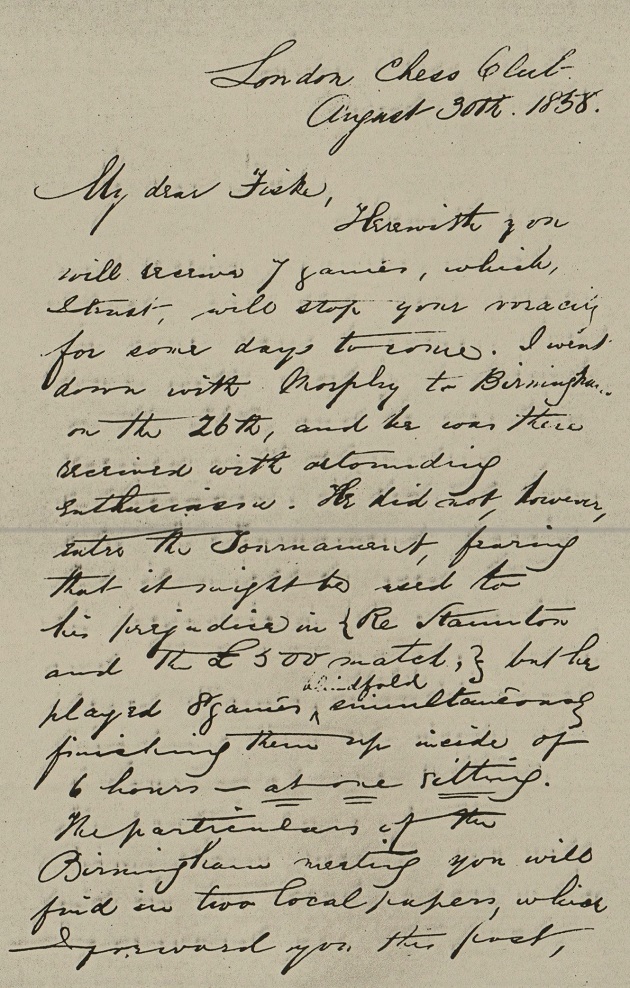
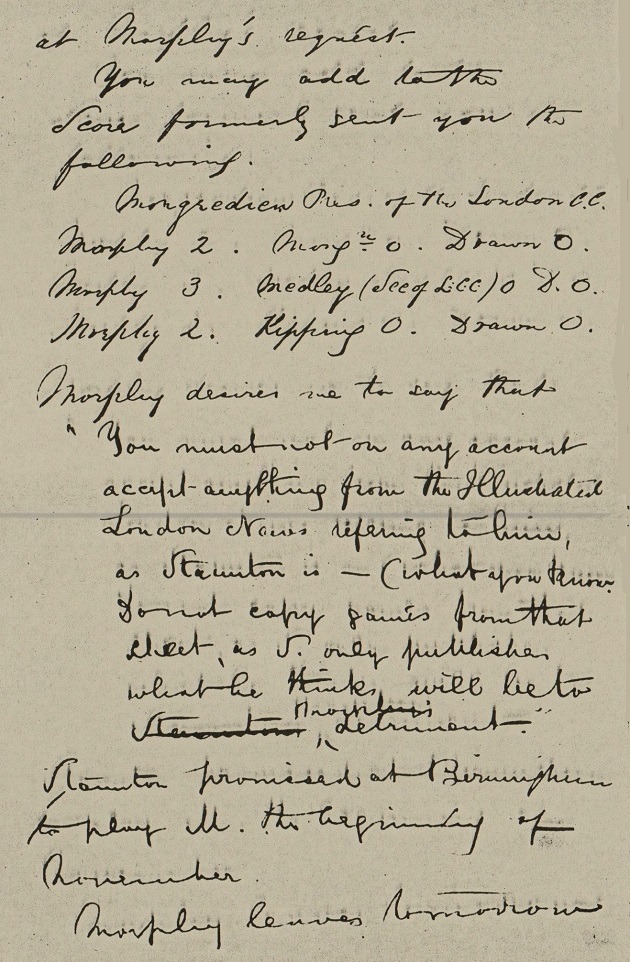
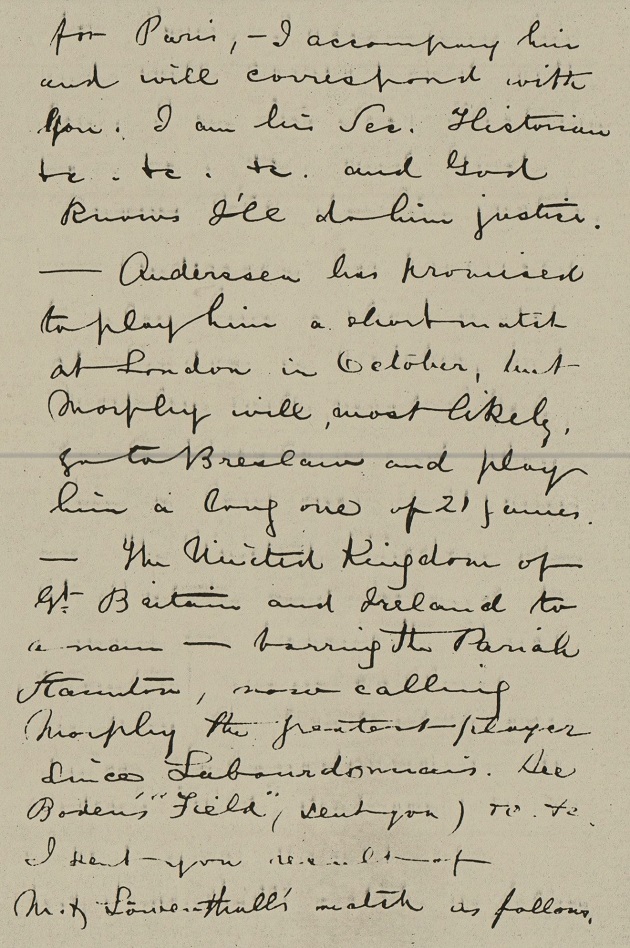
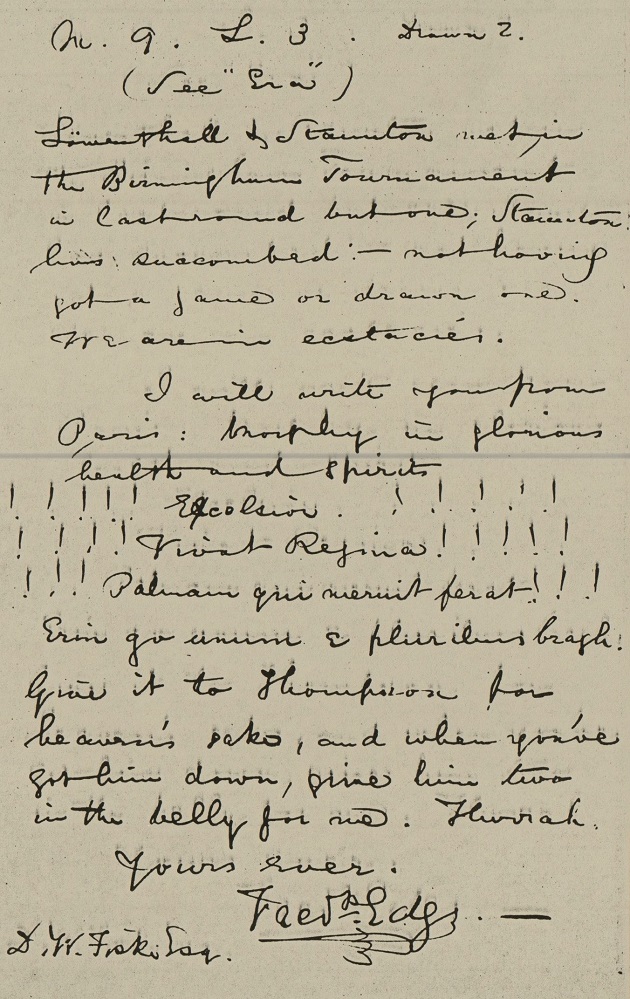
(11836)
We reproduce the Edge letter (3 April 1859) which James J. Barrett submitted for publication in C.N. 840:
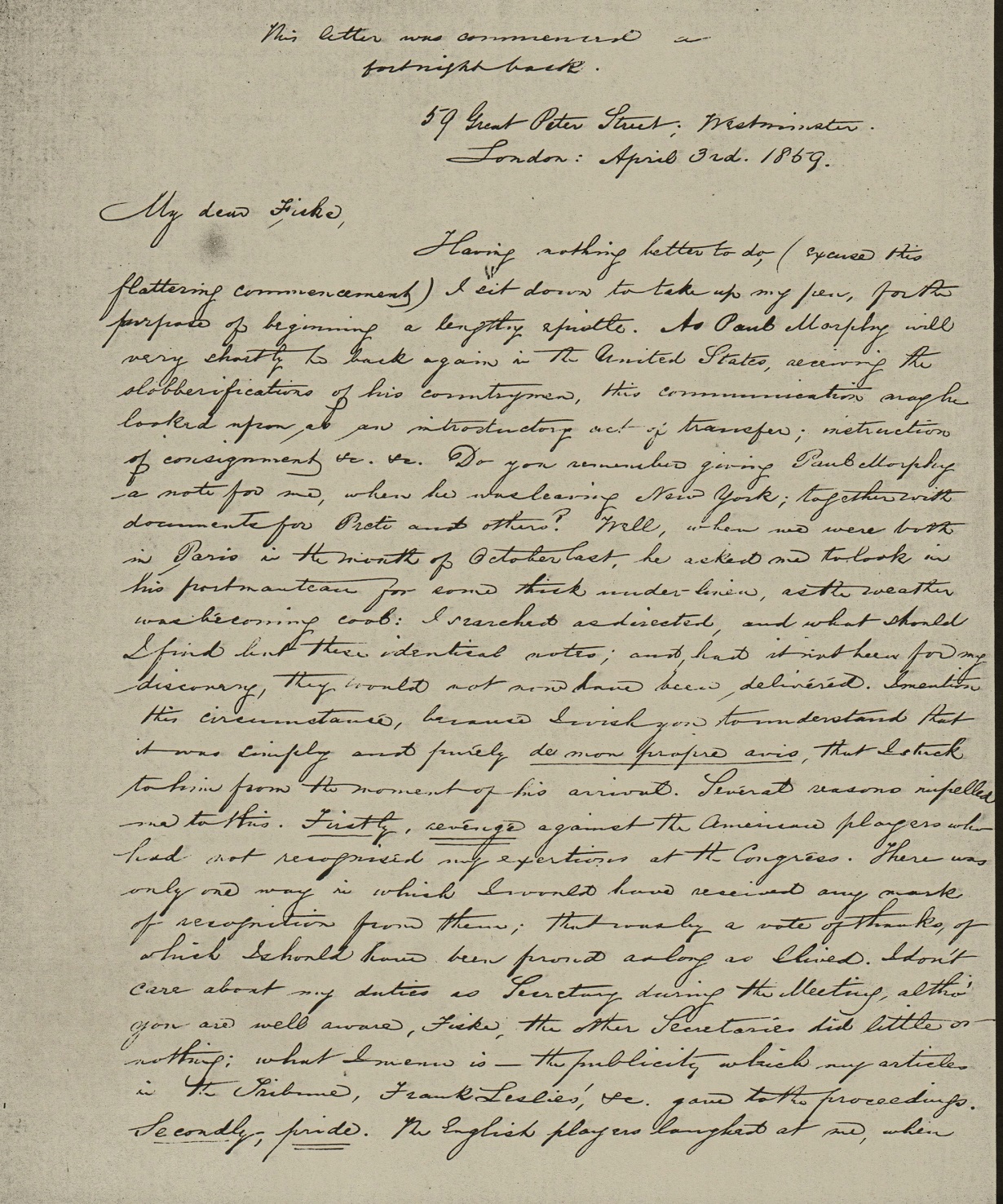
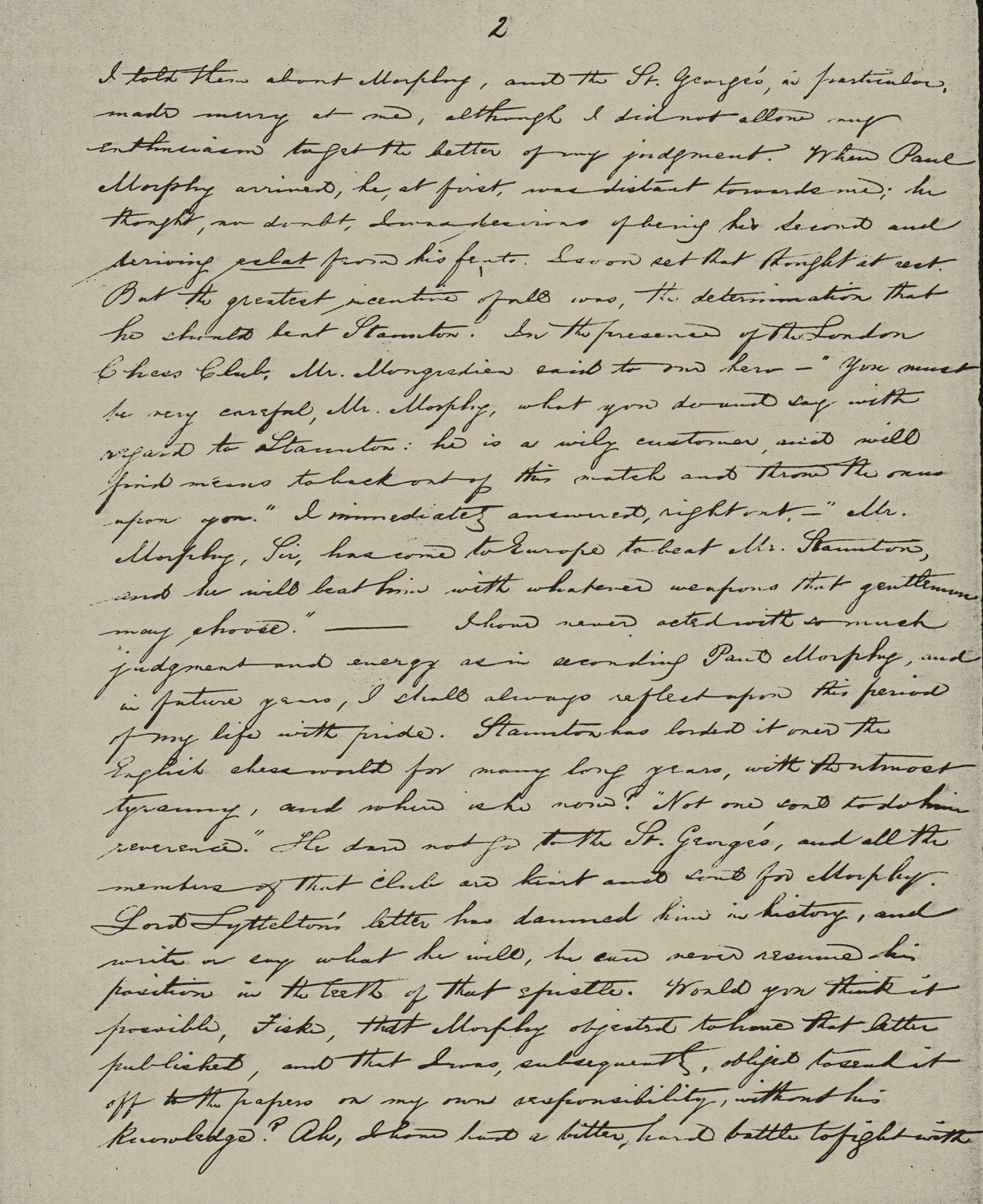
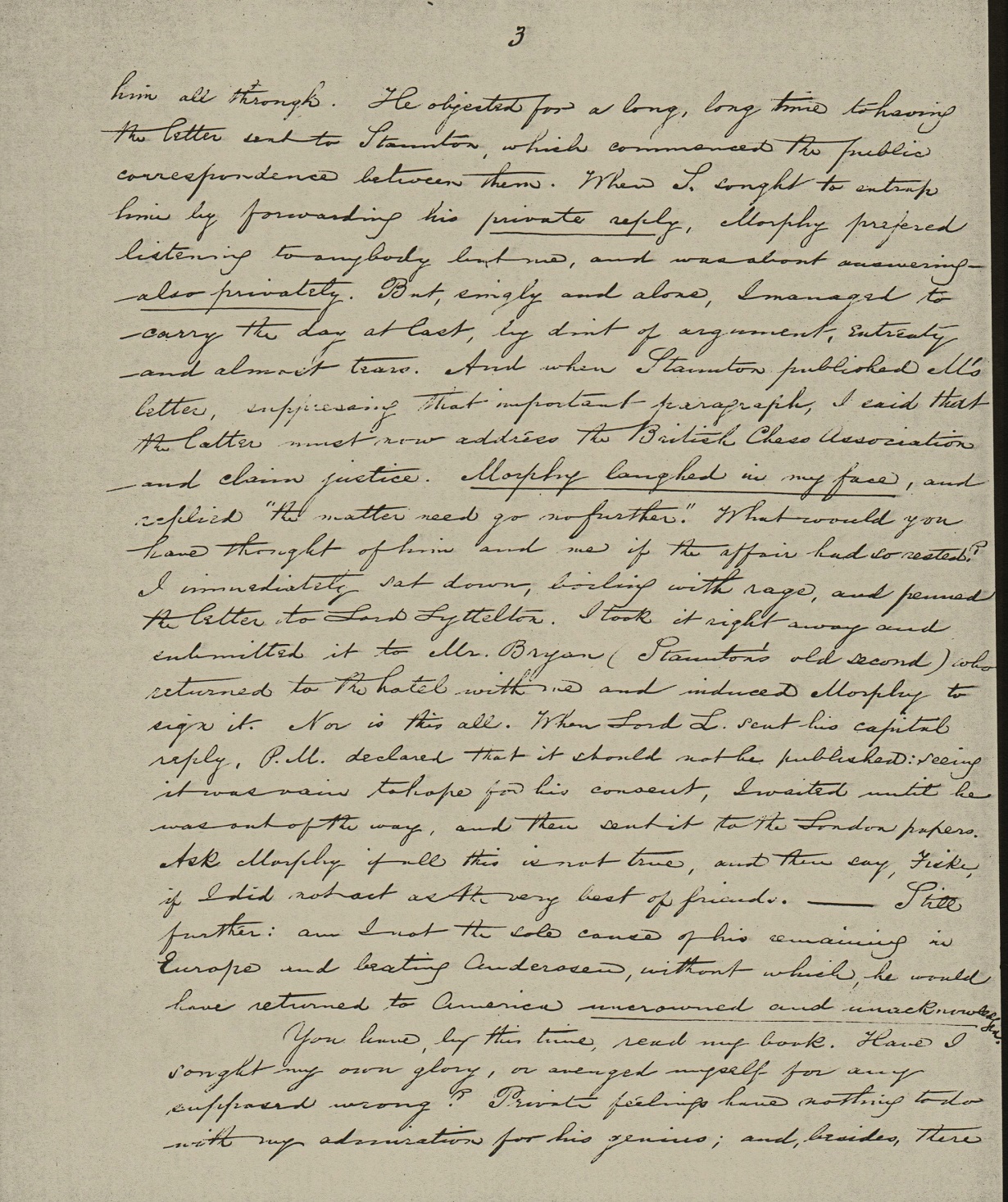
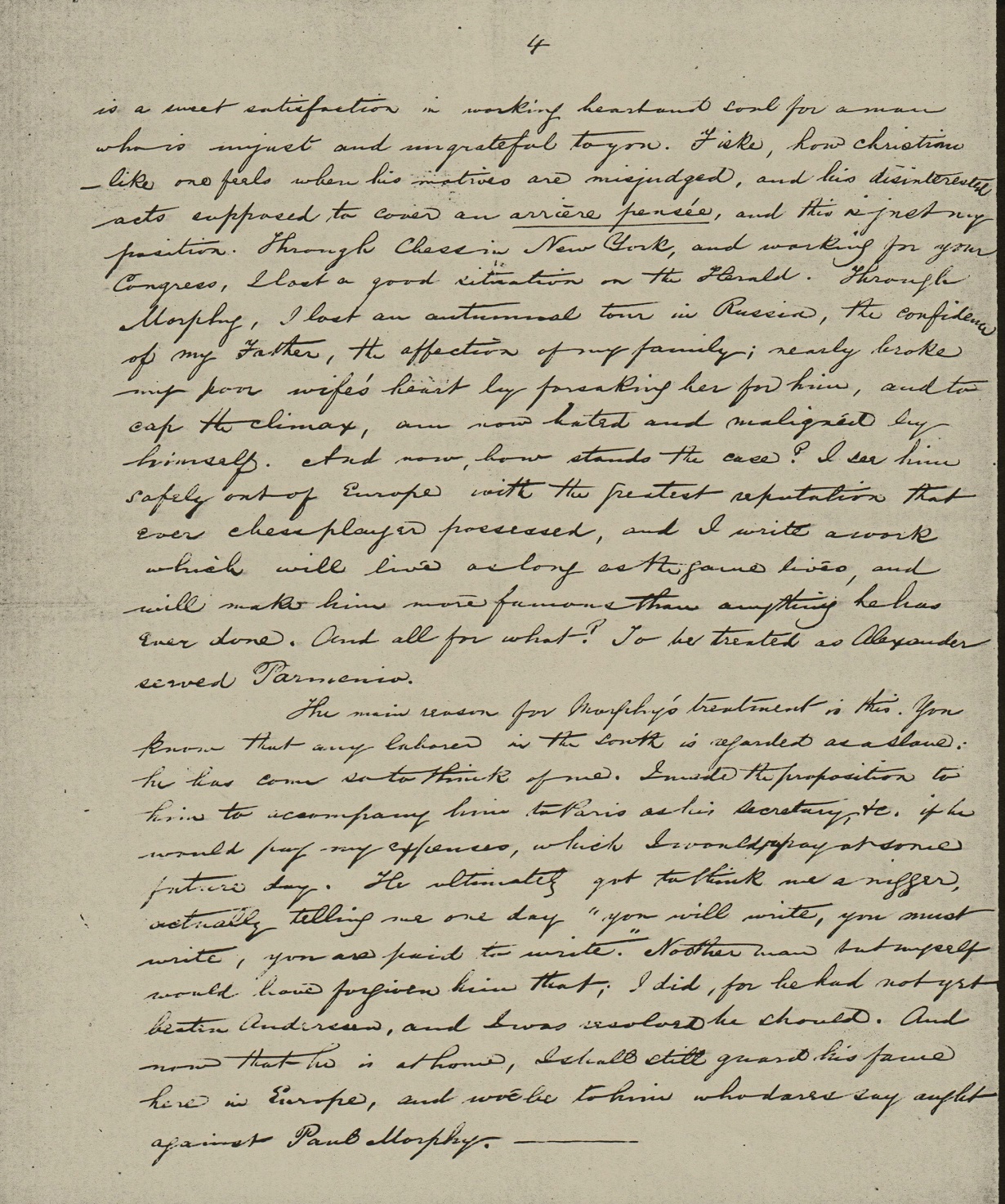
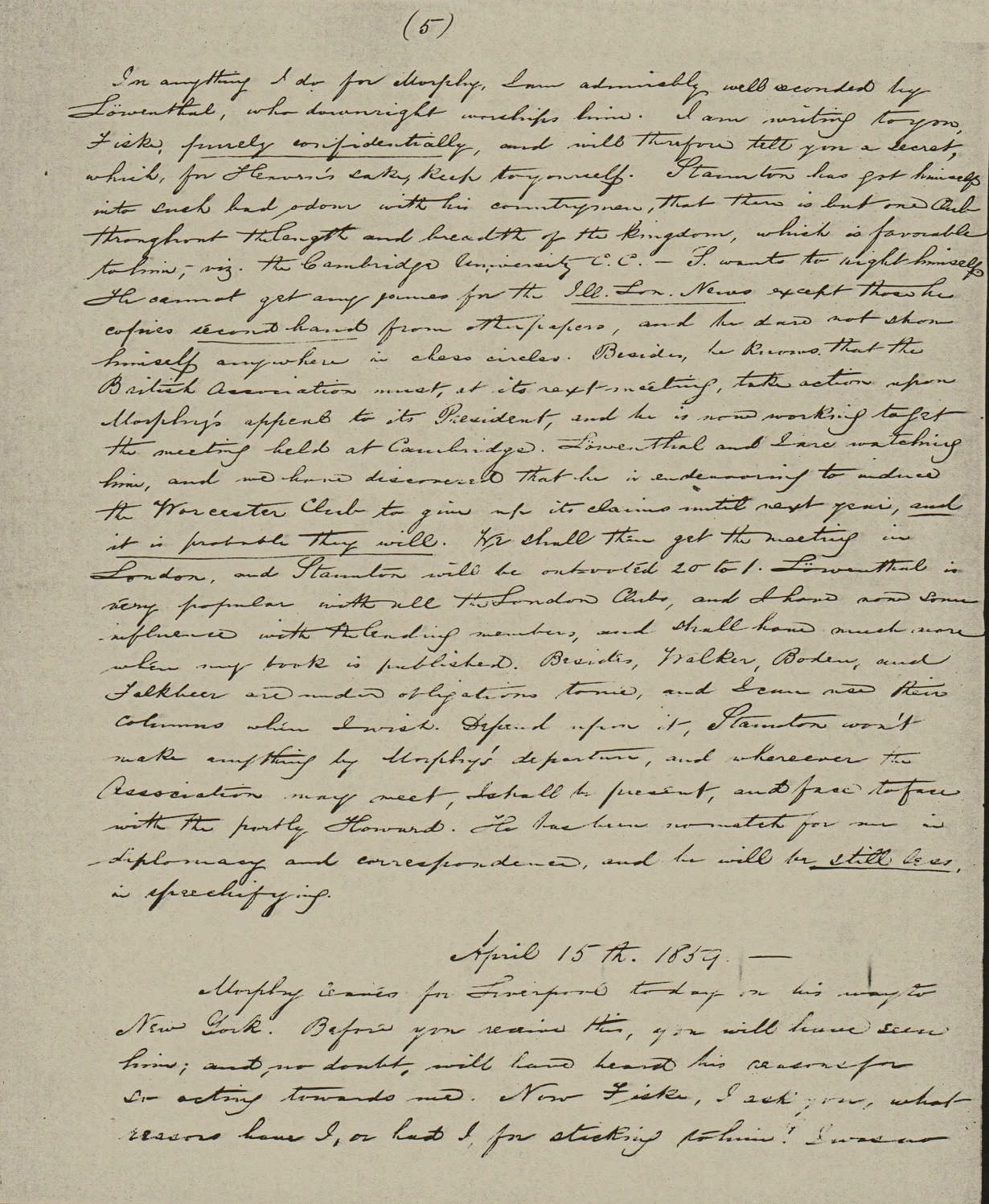
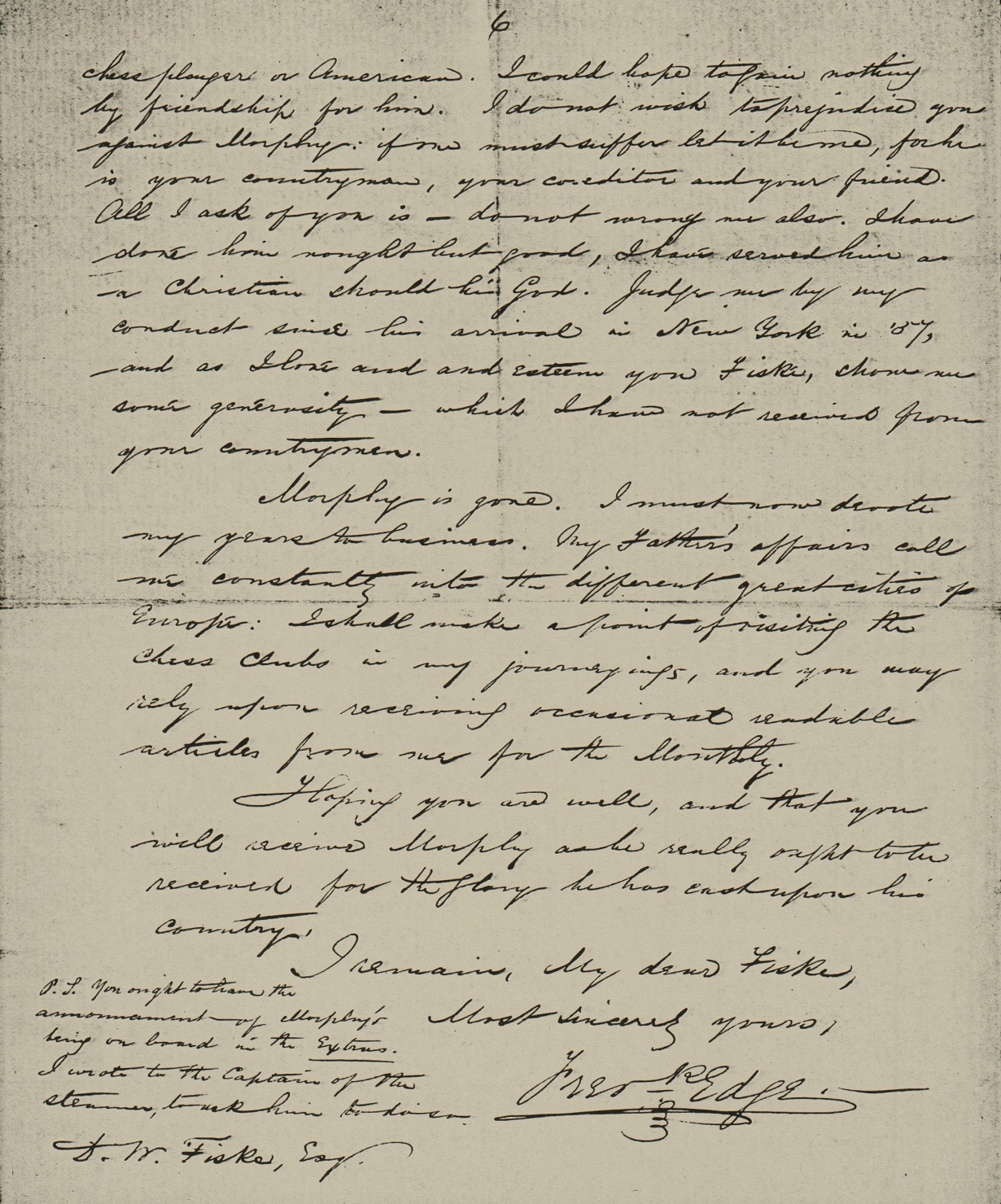
Below, in chronological order, are the remainder of the Edge-Fiske letters of which we have copies. Some were quoted, in full or in part, in David Lawson’s monograph on Morphy. In three cases, only the first part of the letter is shown here (for identification purposes) because the complete copy of the letter is not legible.
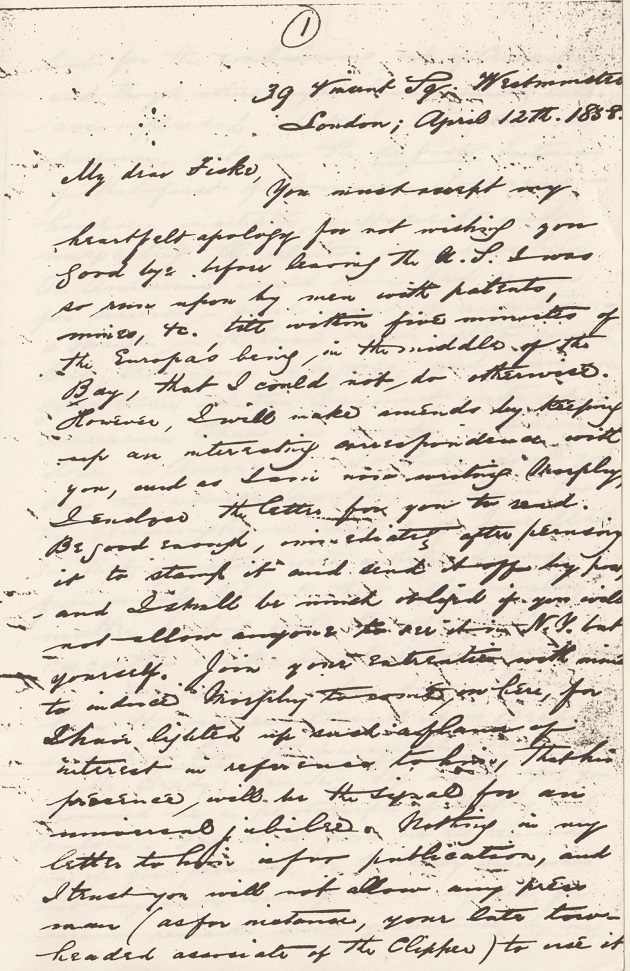
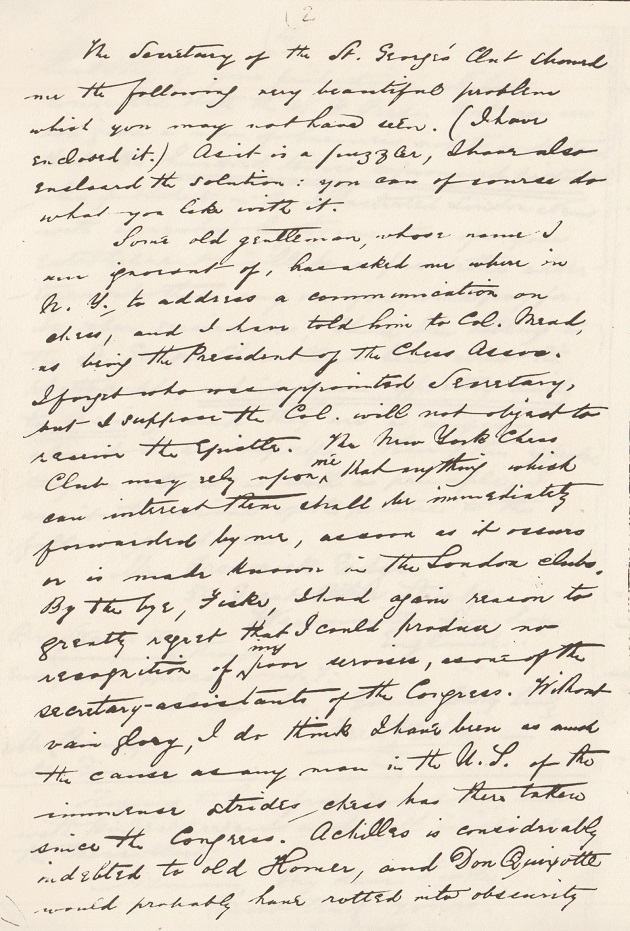
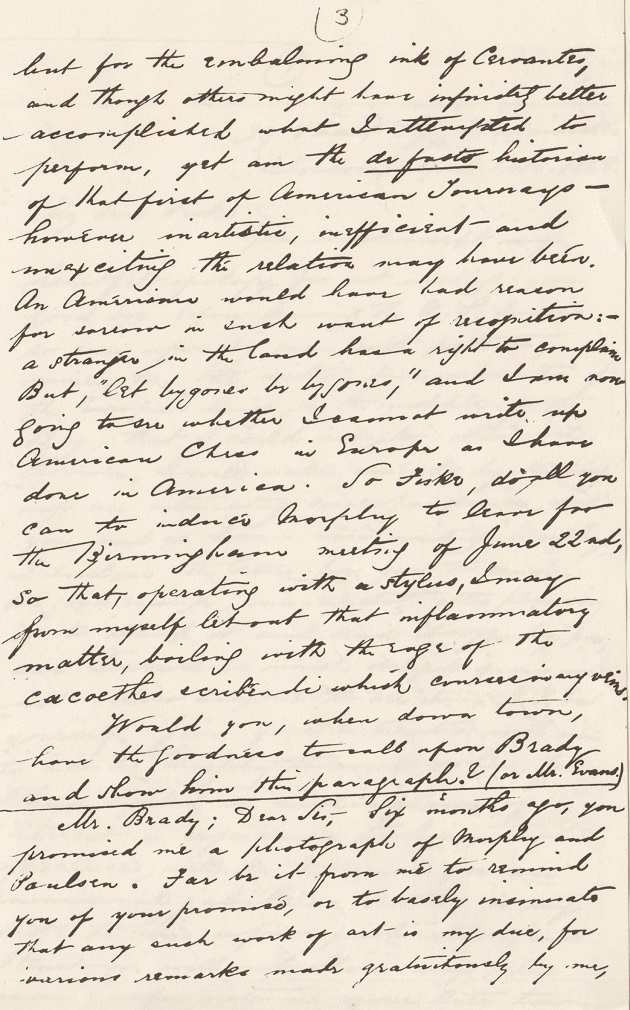
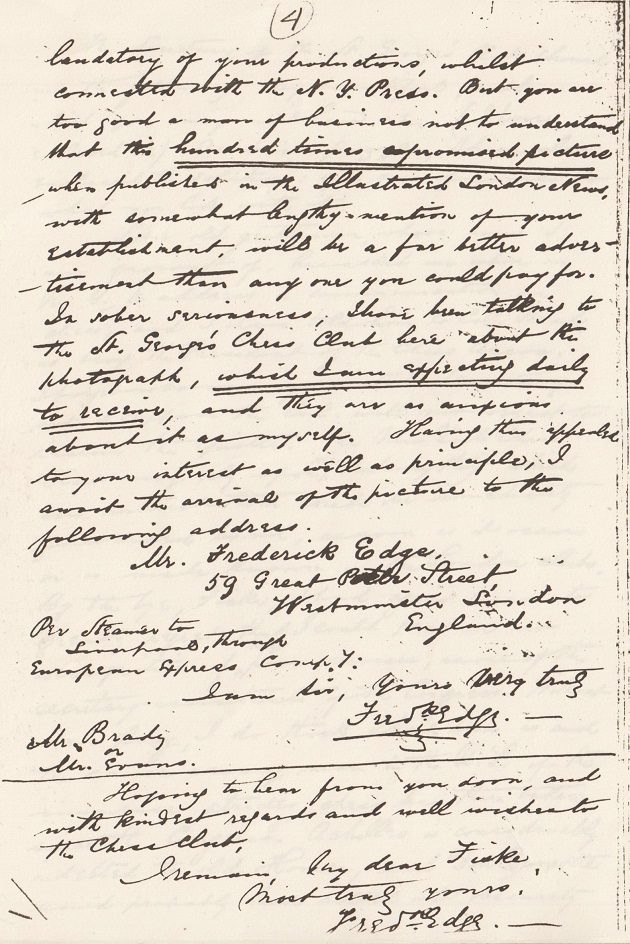
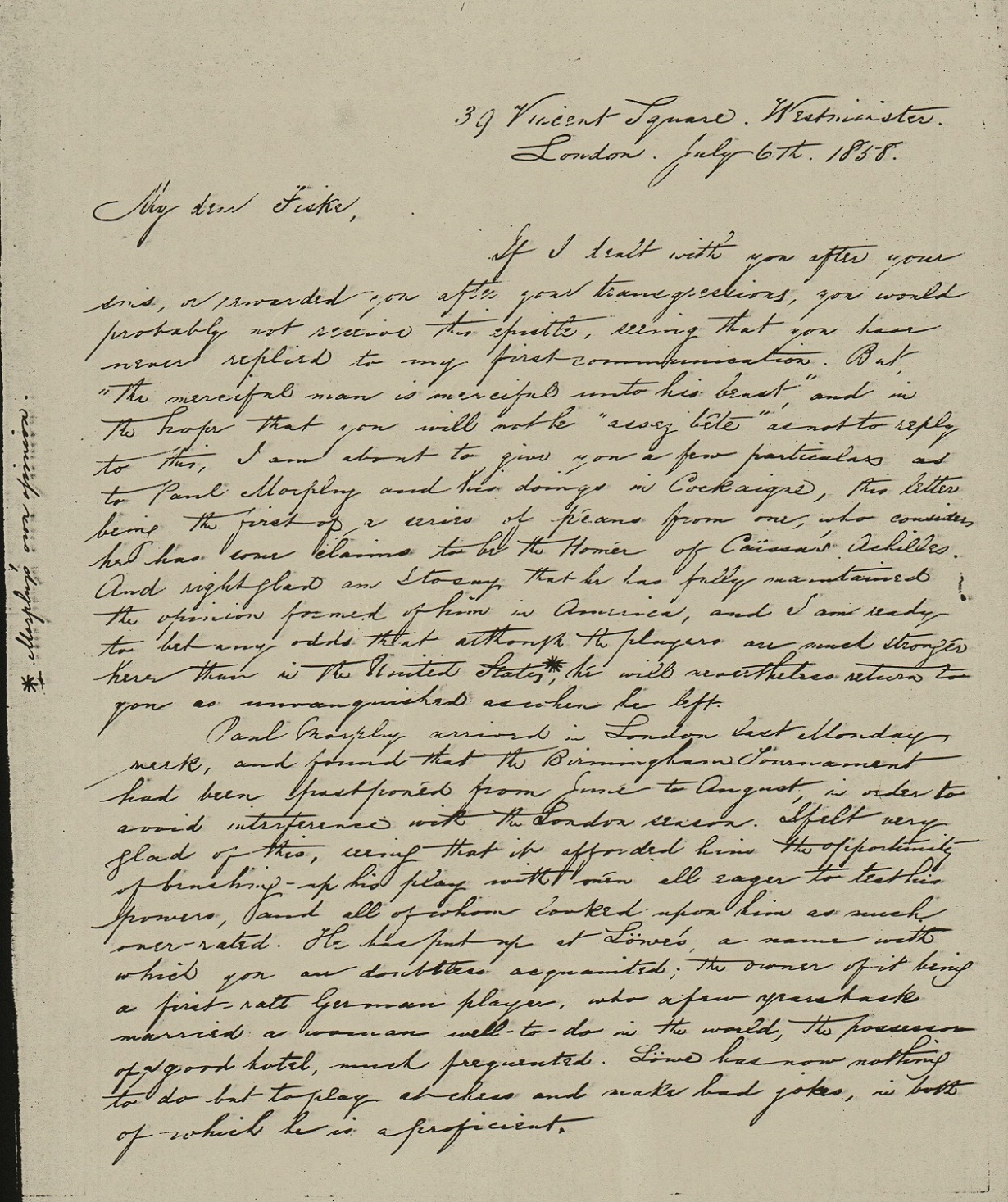
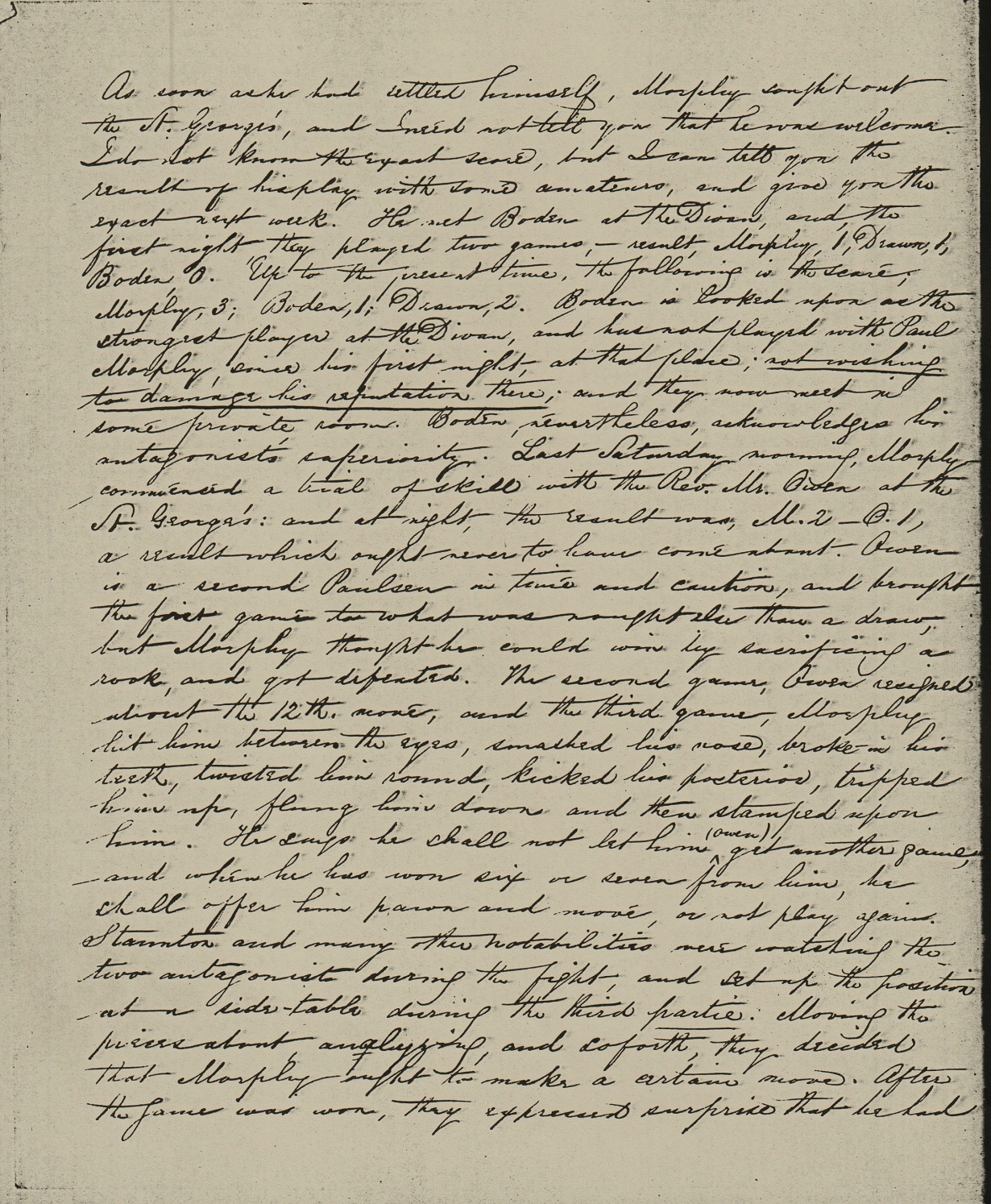
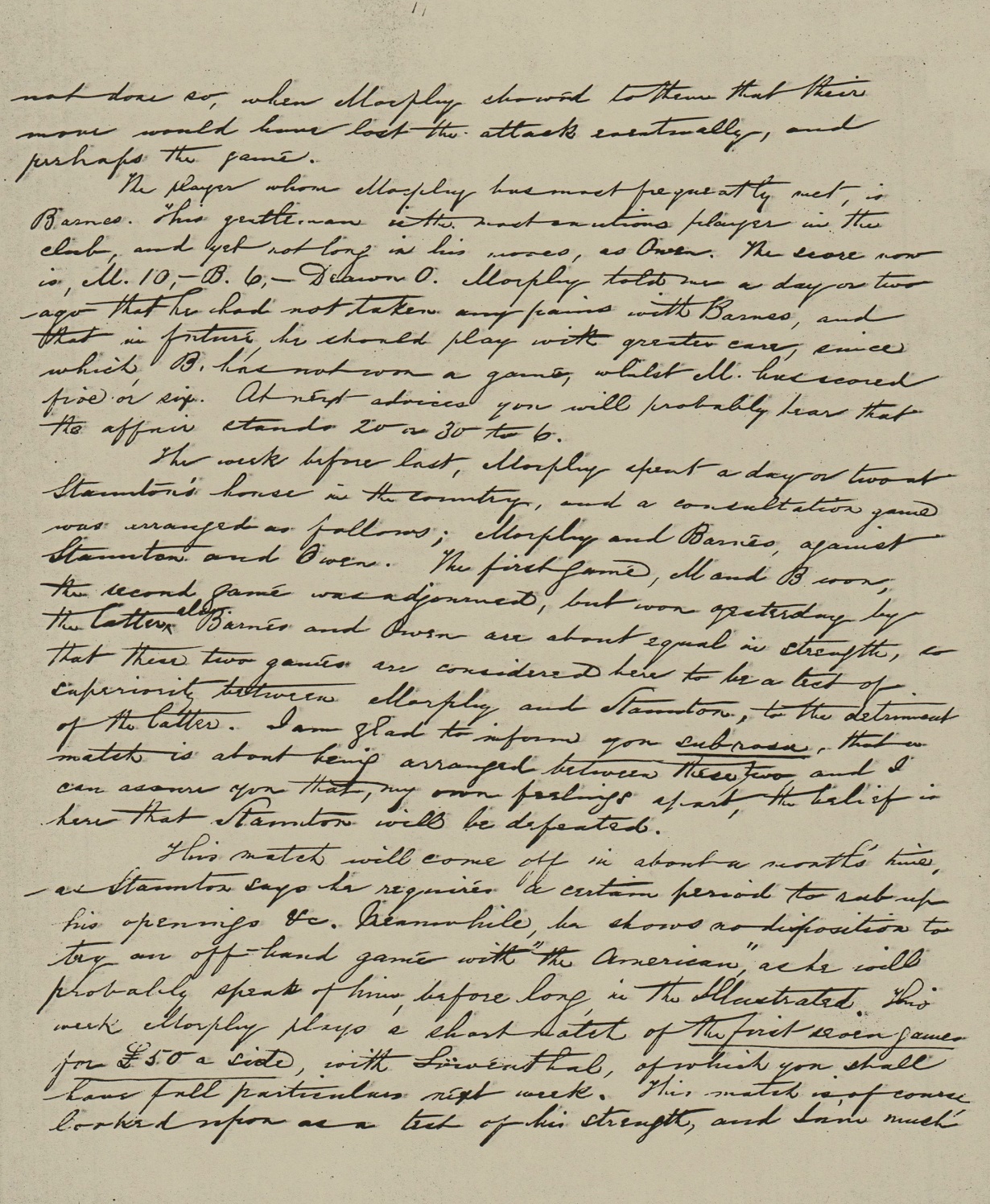
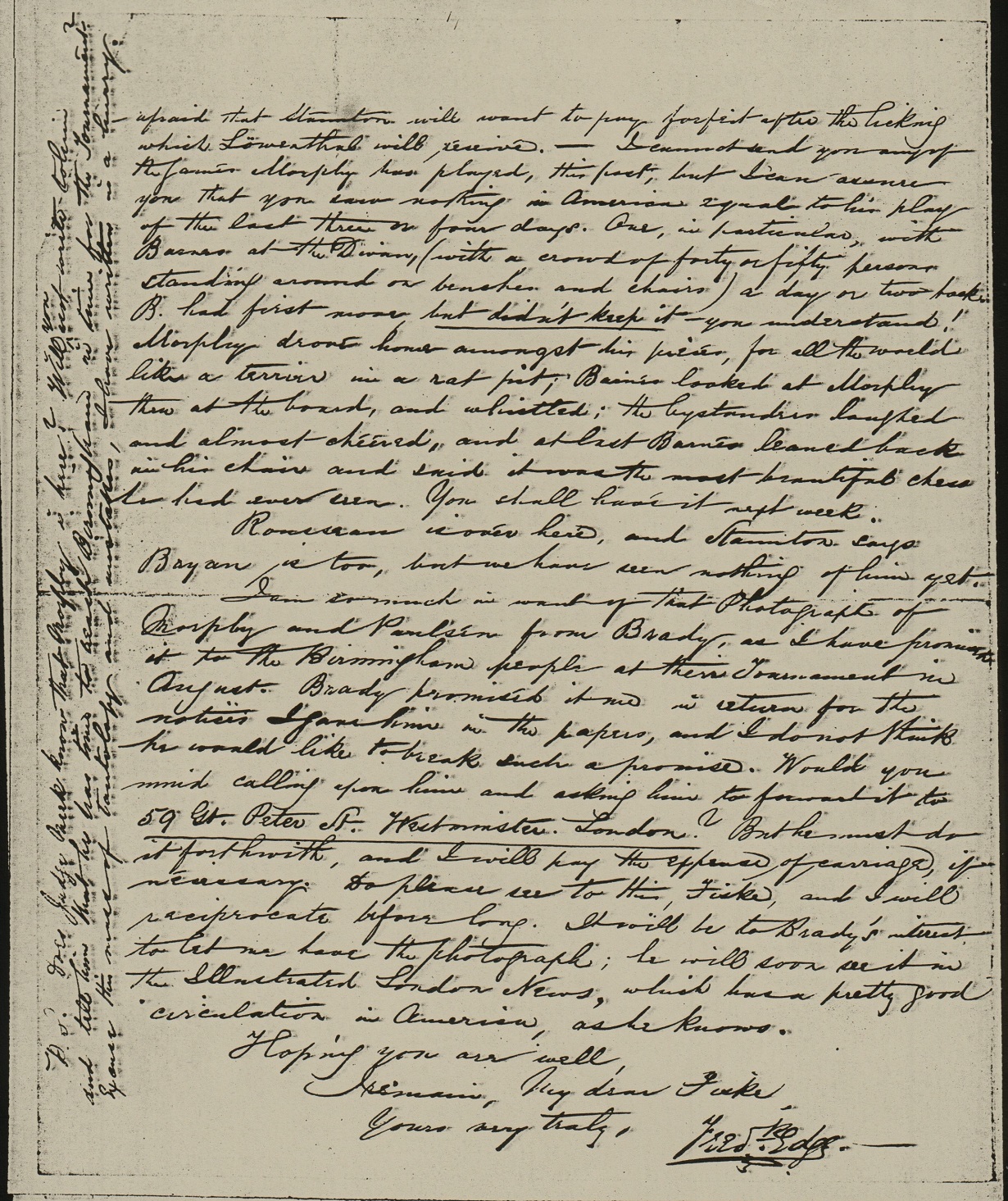
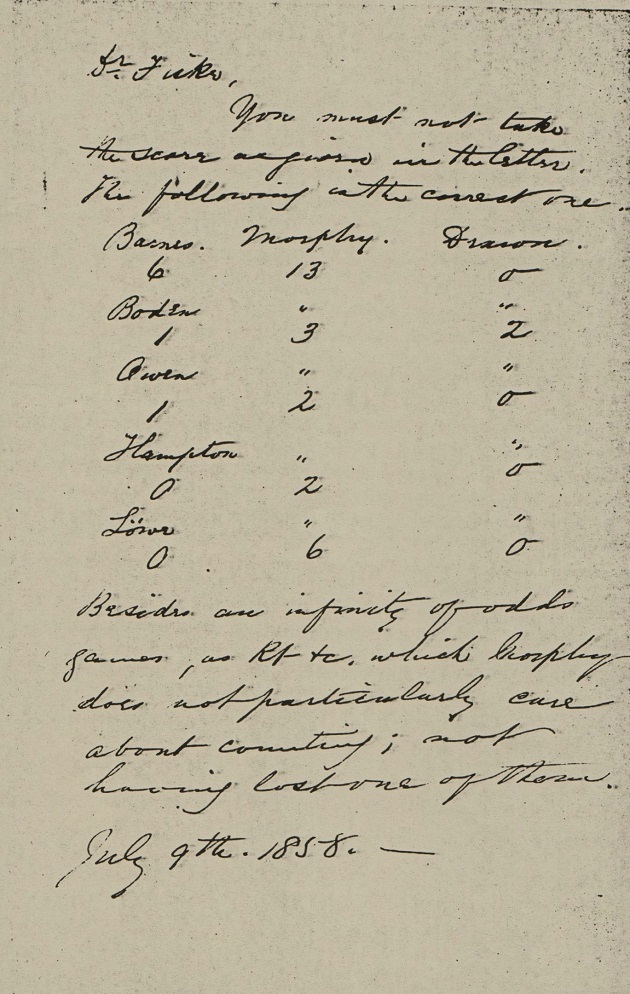
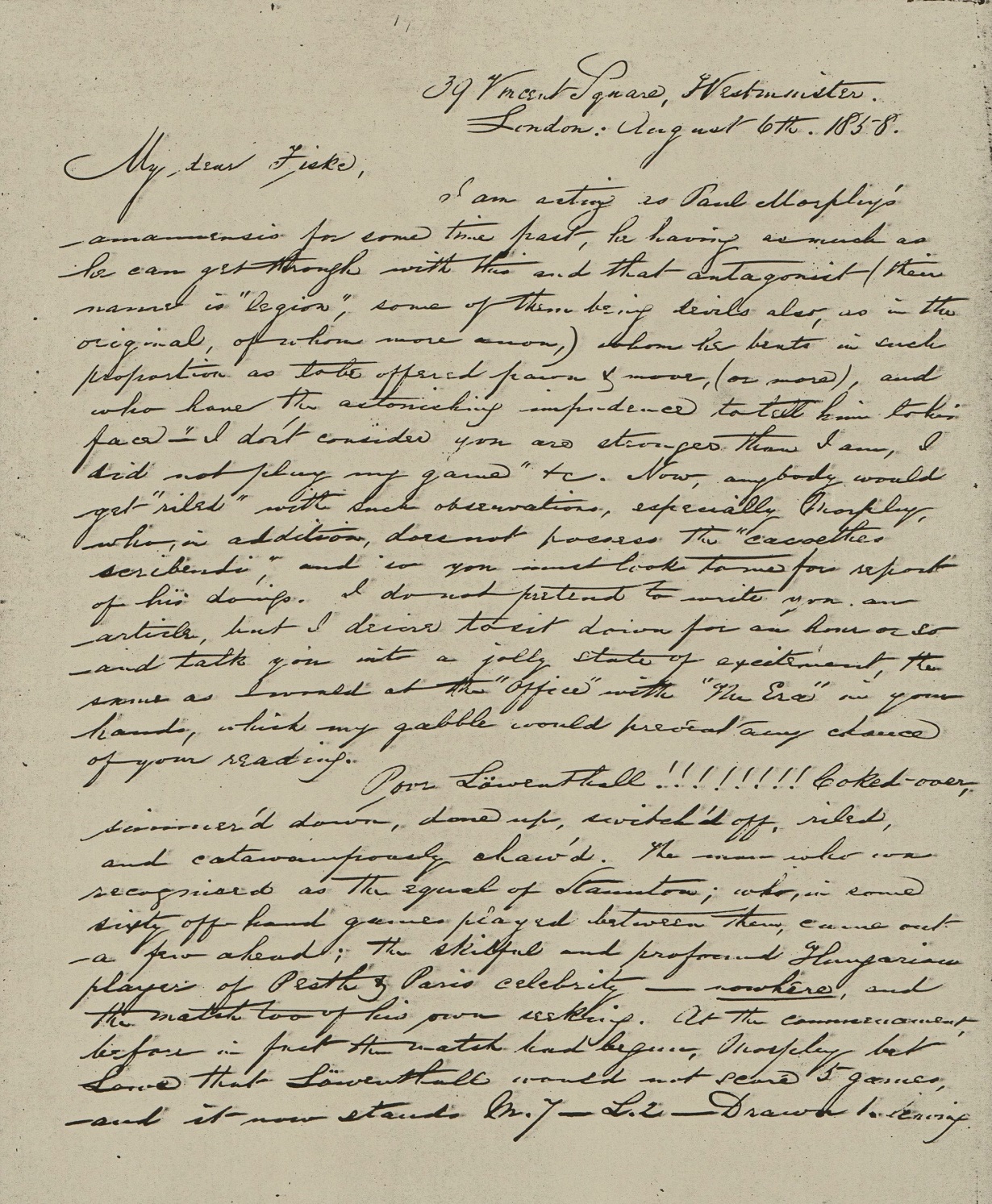
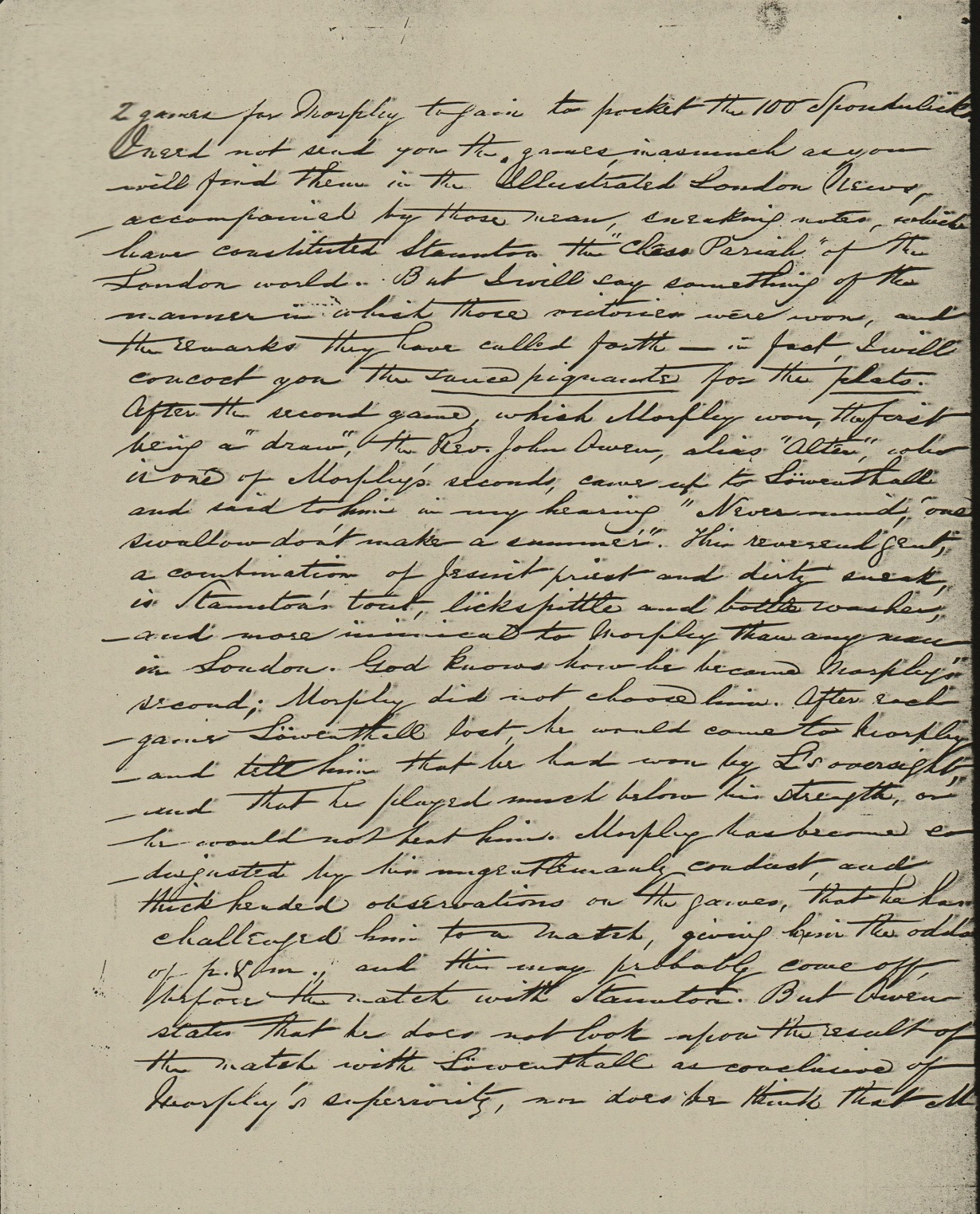
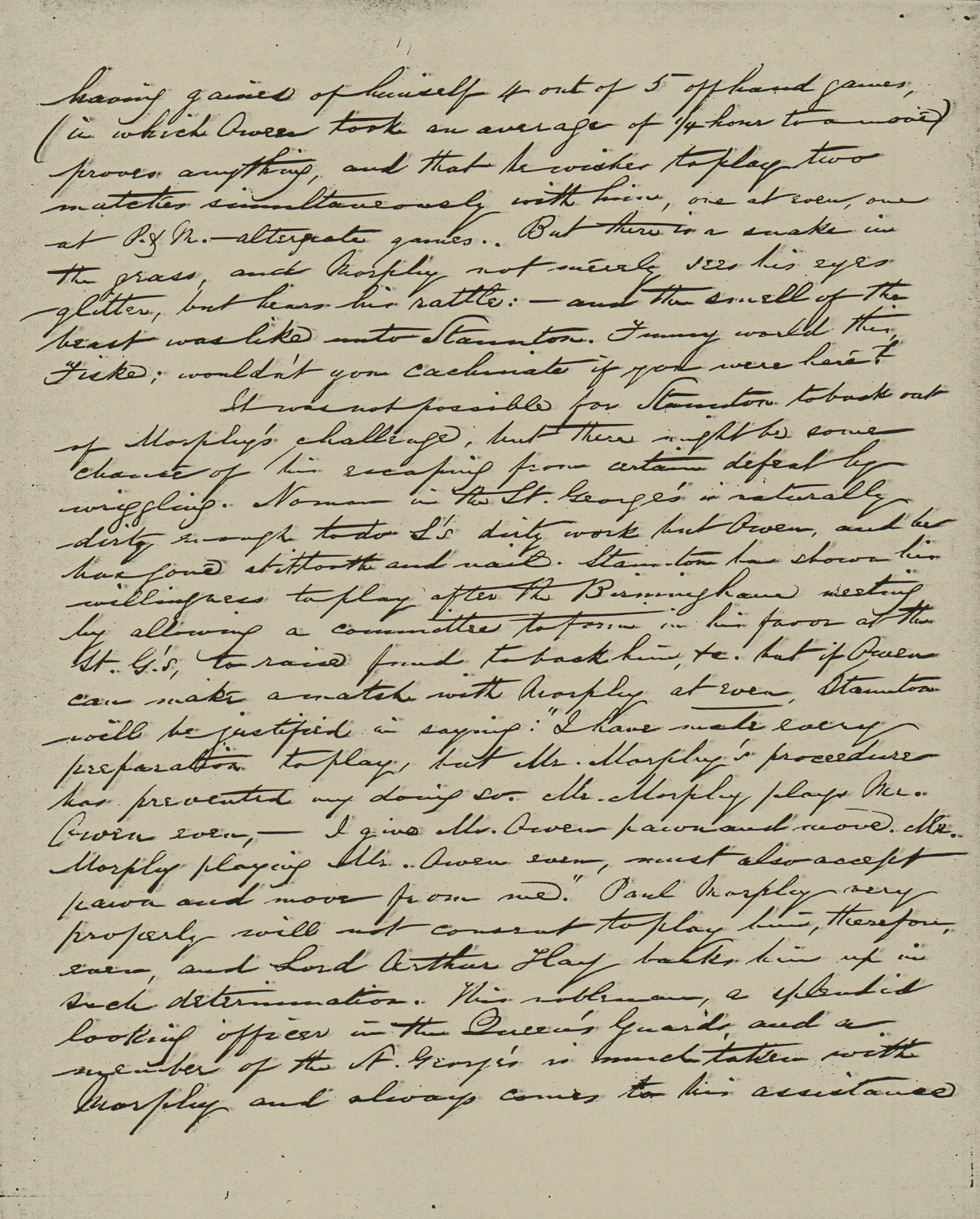
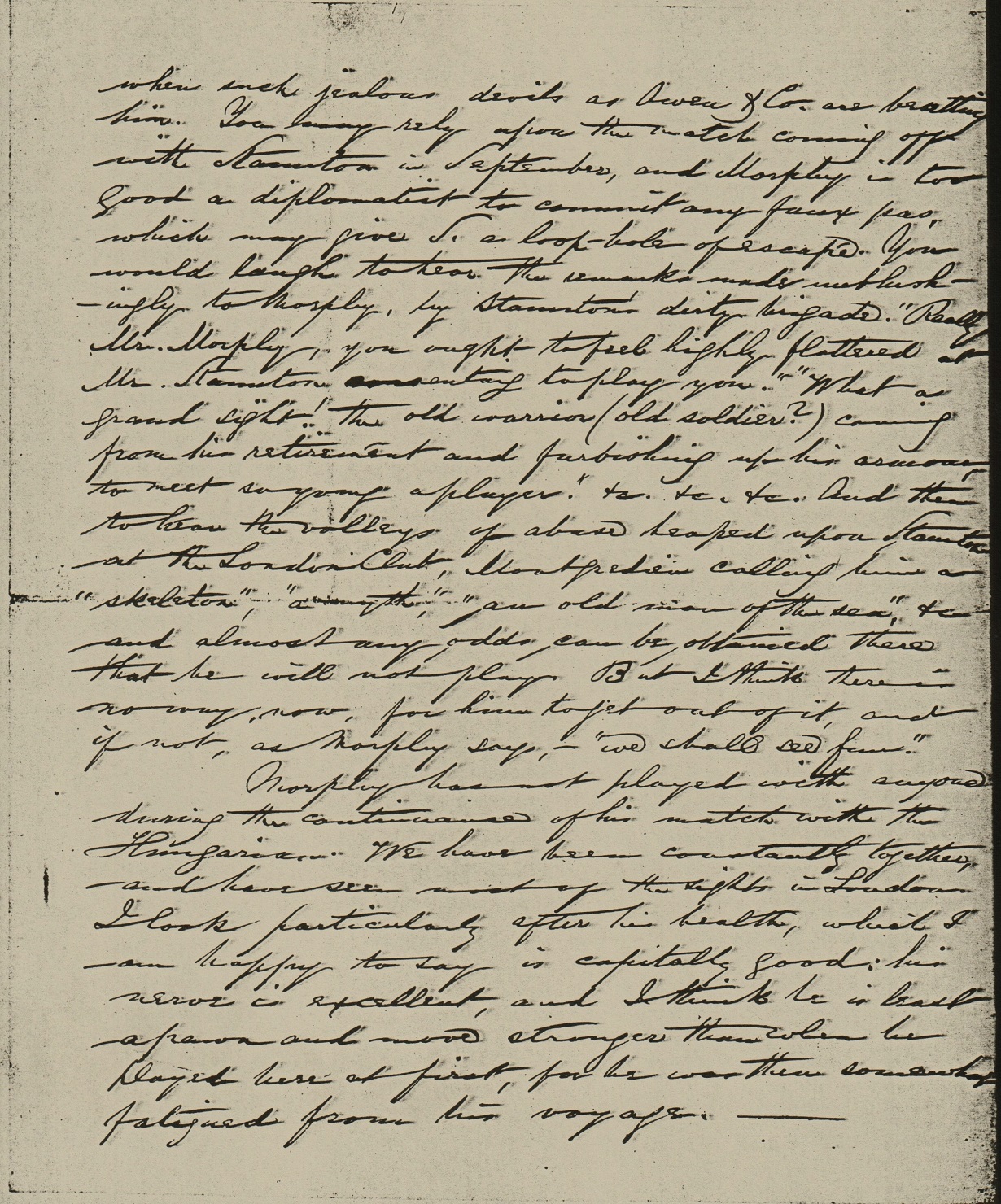
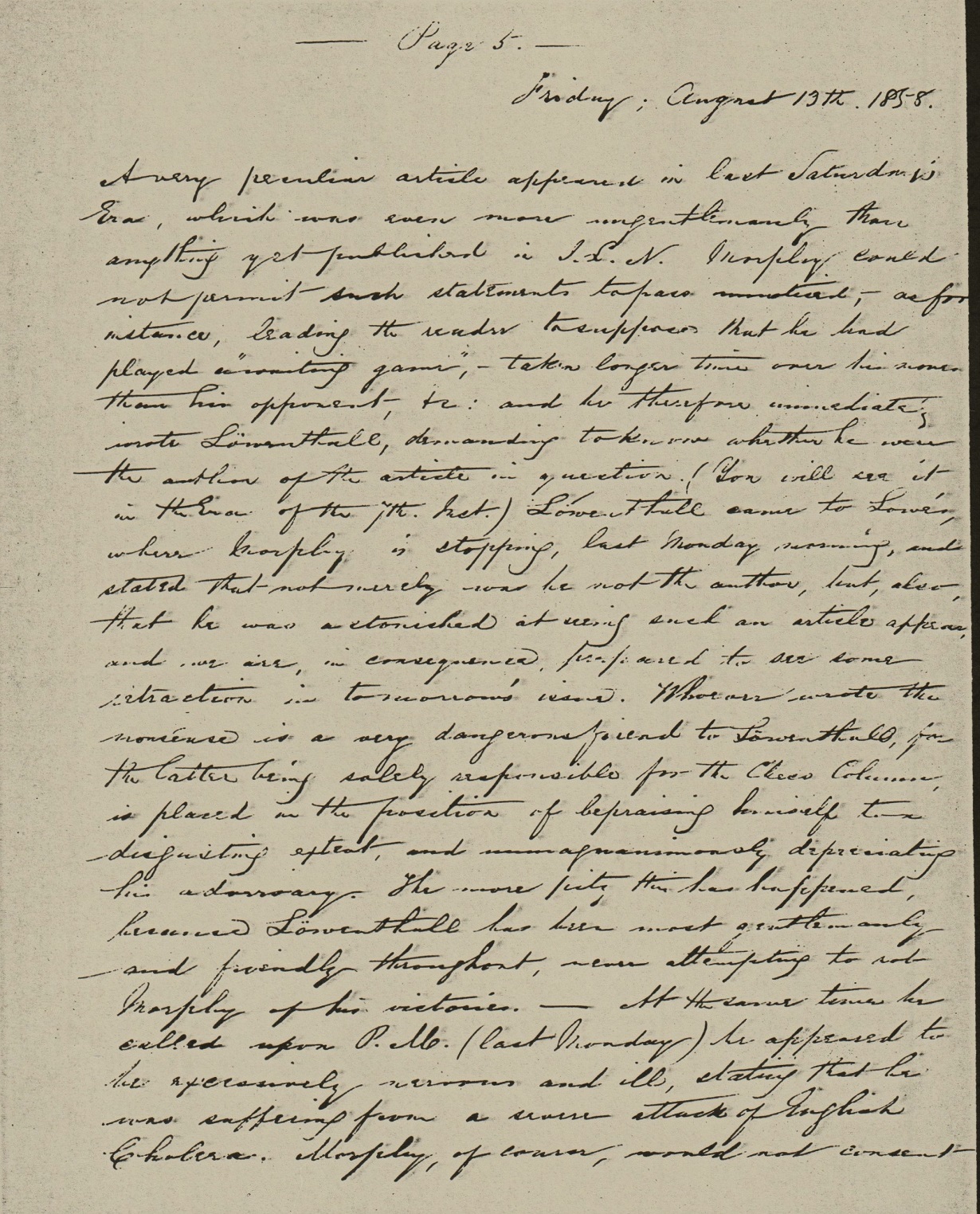
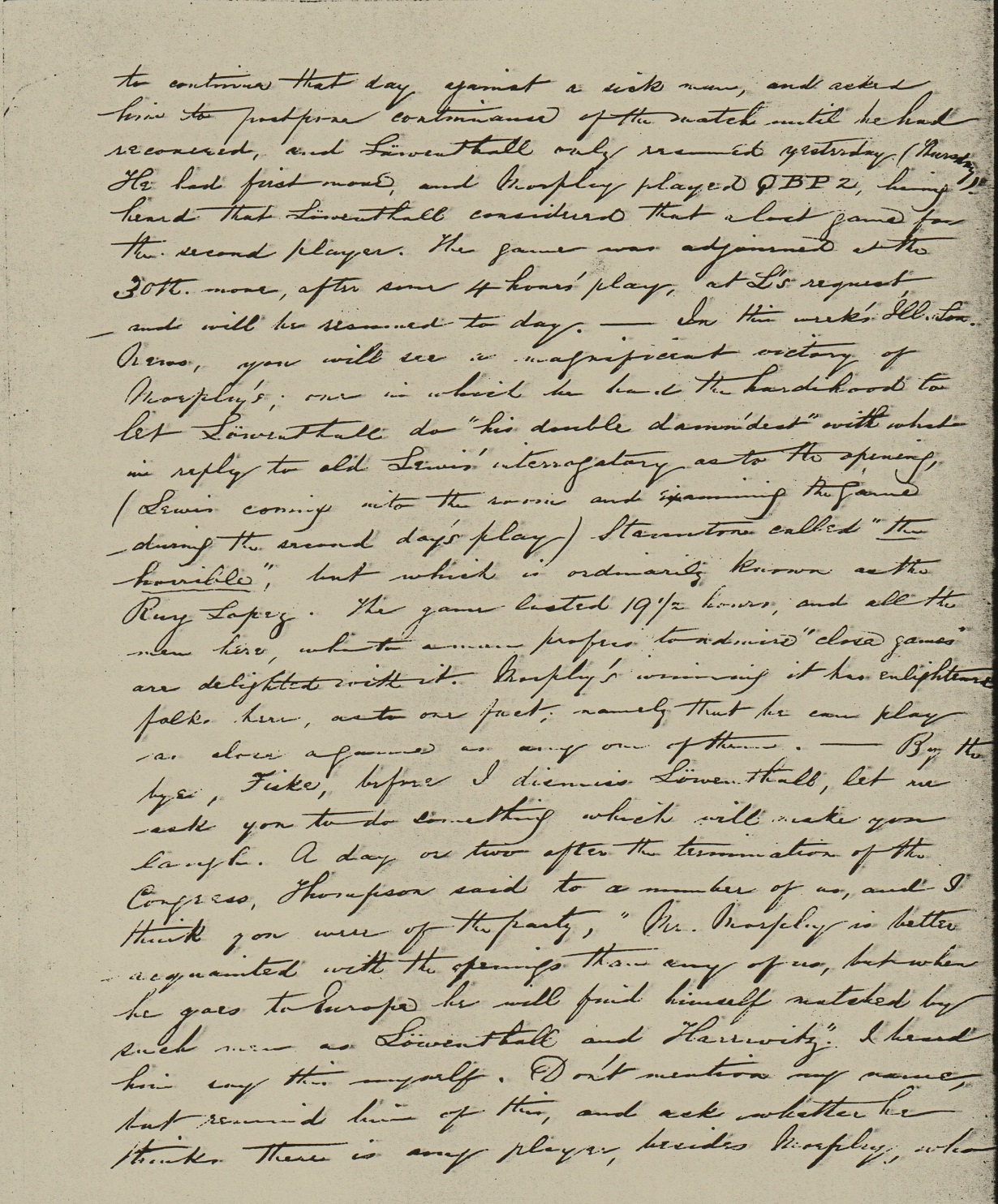
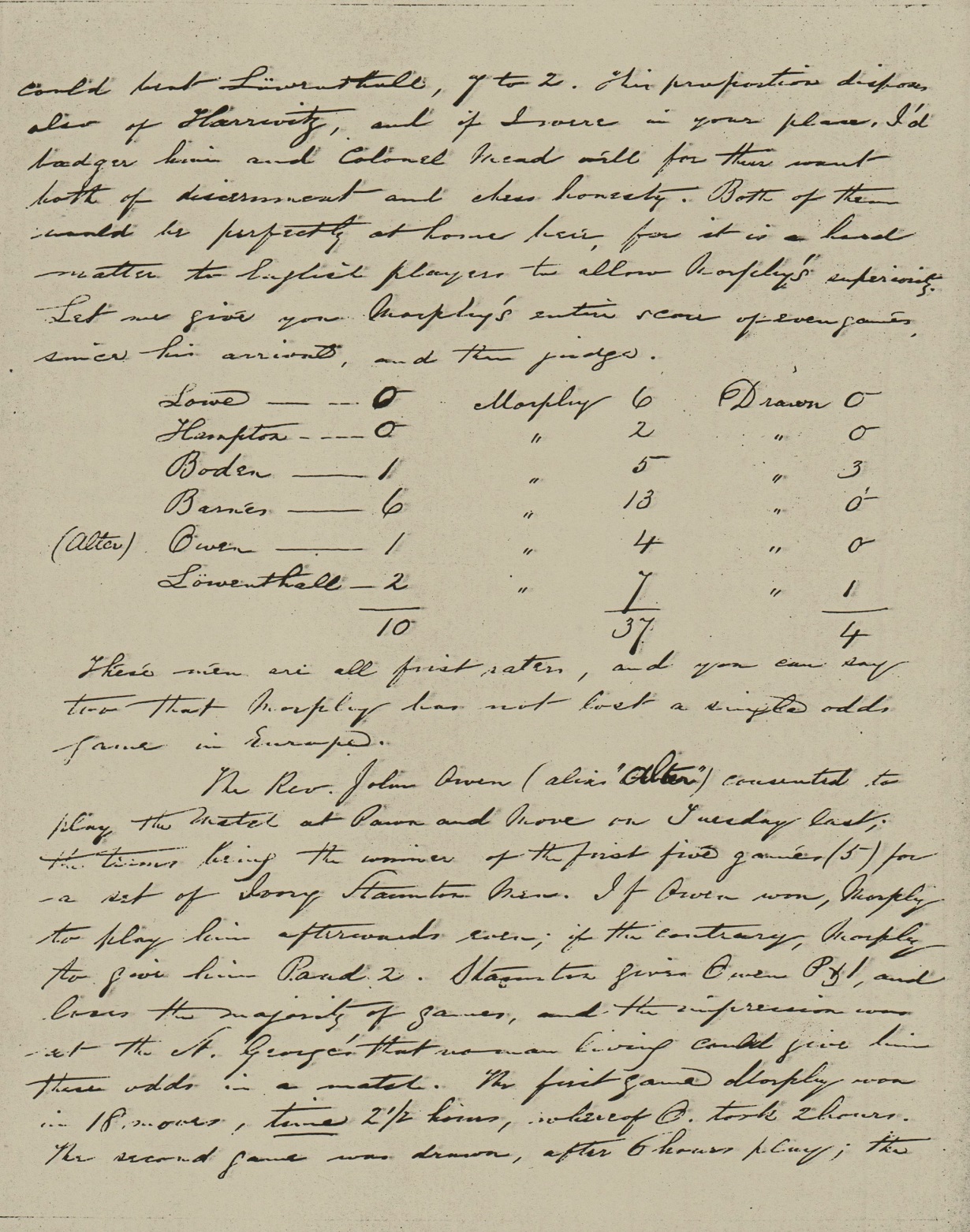
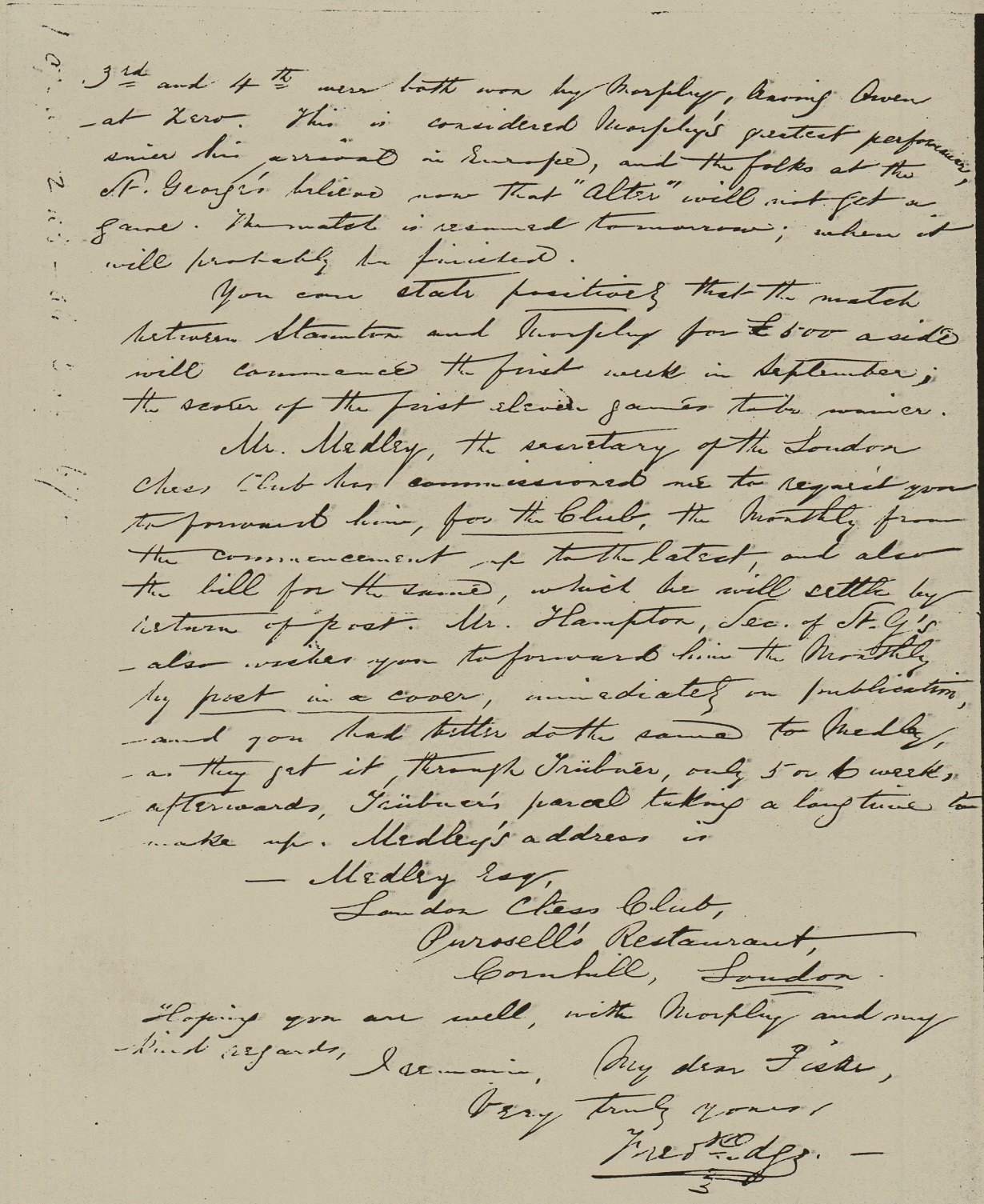
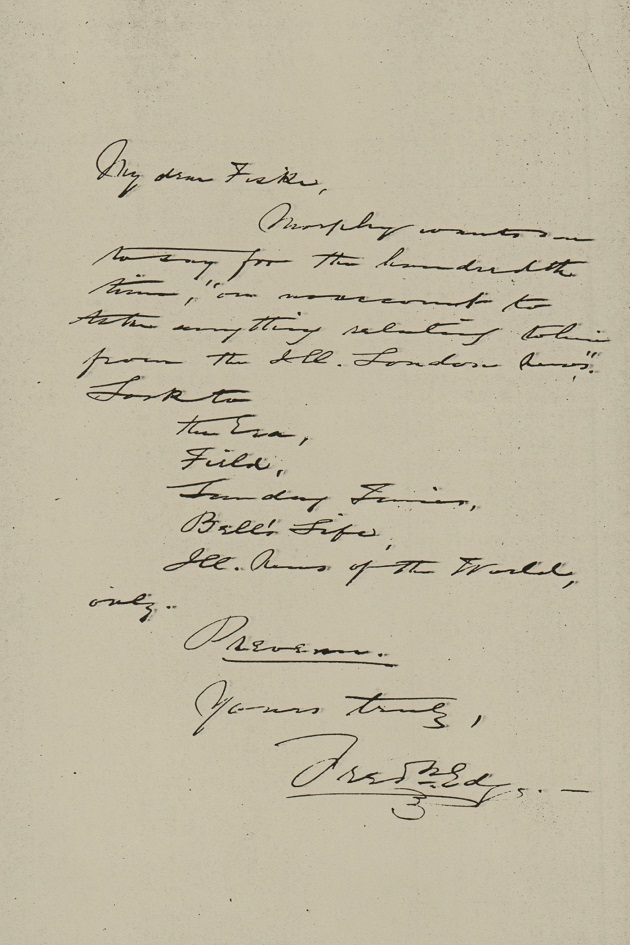
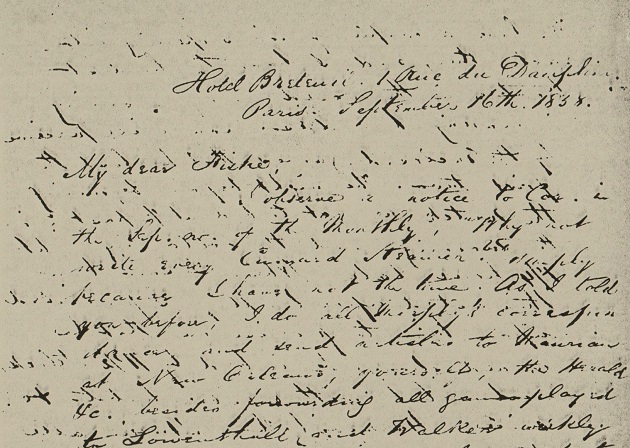
This four-page letter dated 16 September 1858 is illegible.
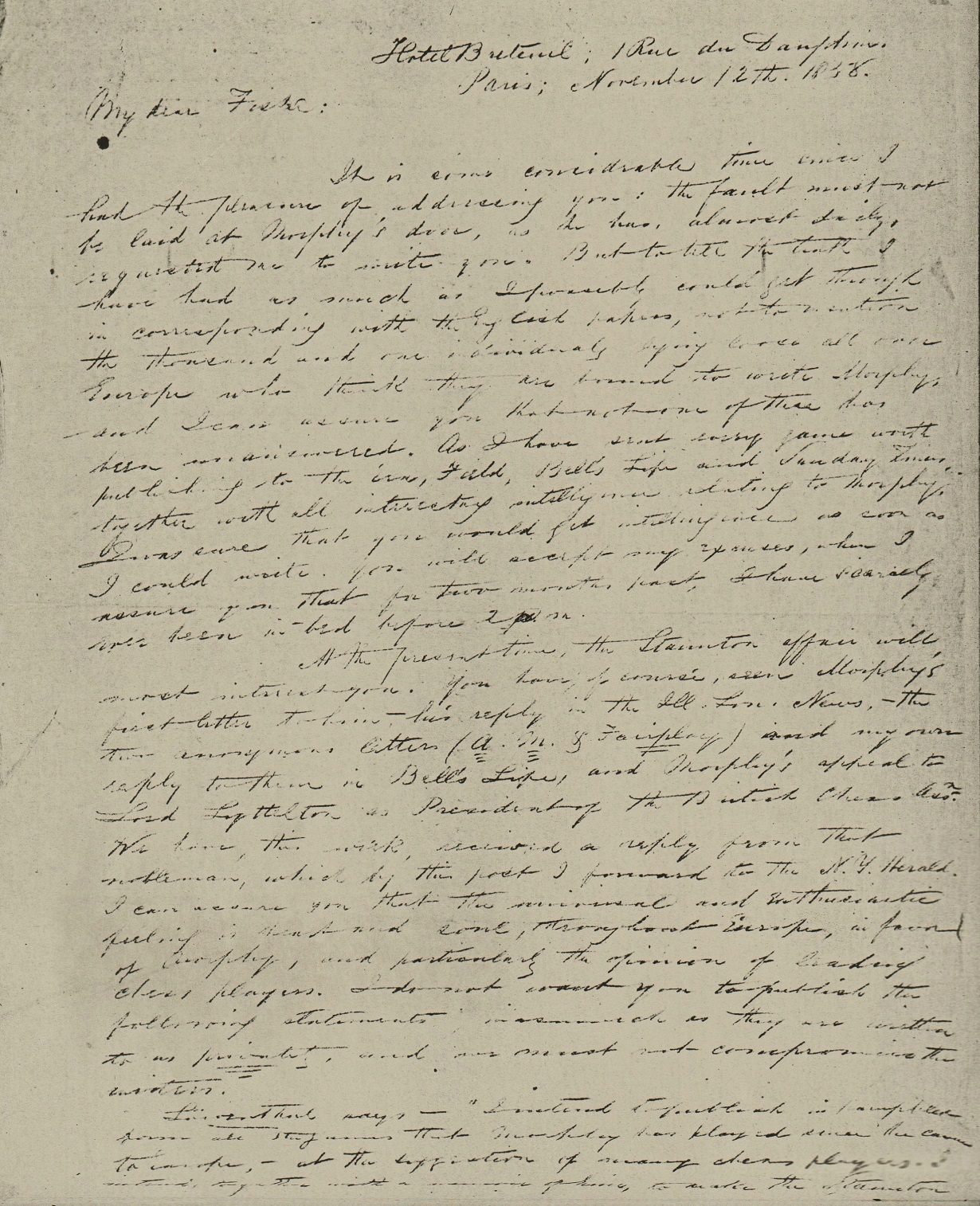
The three remaining pages are illegible.
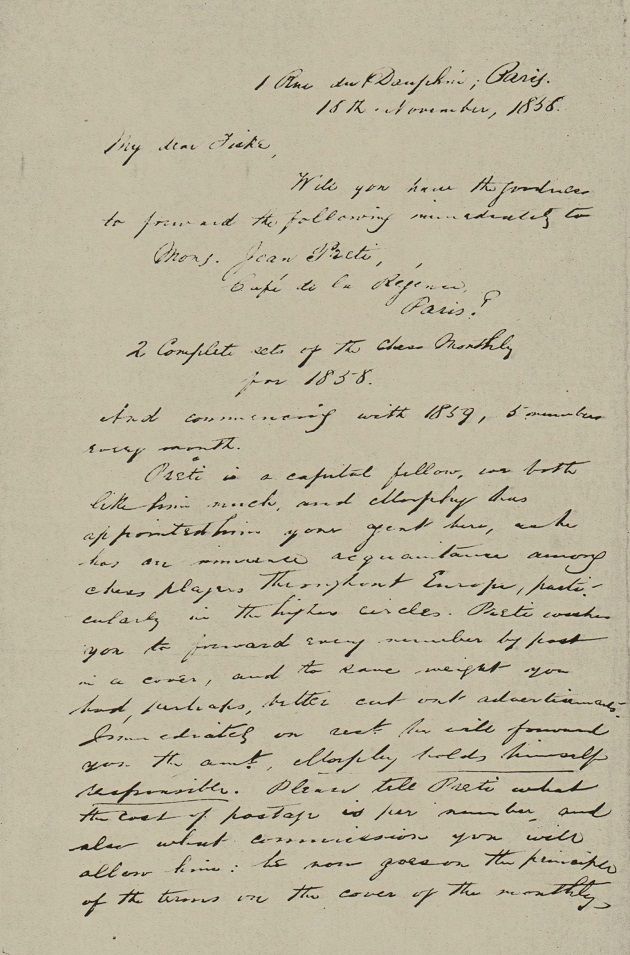
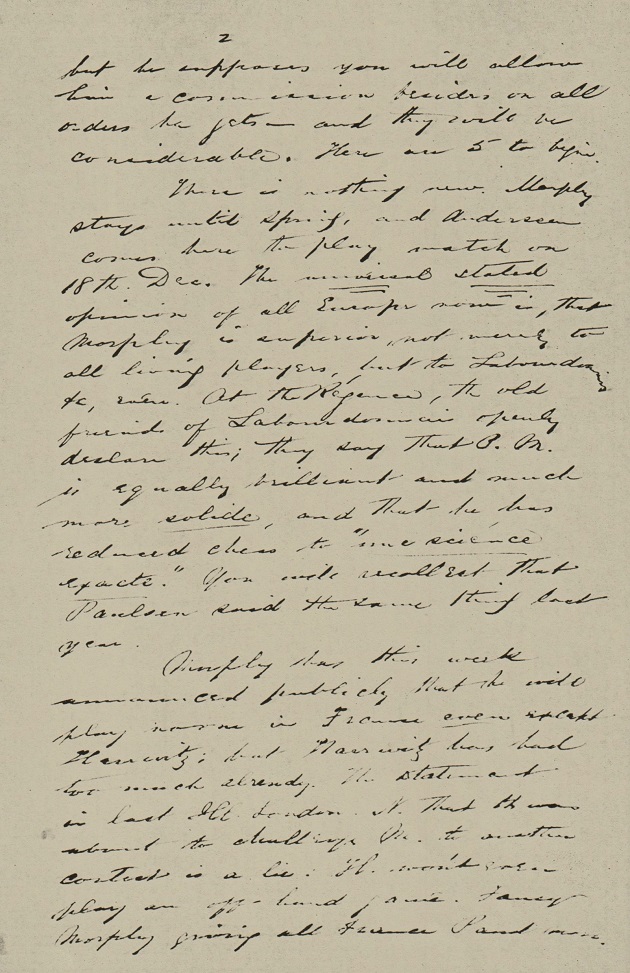
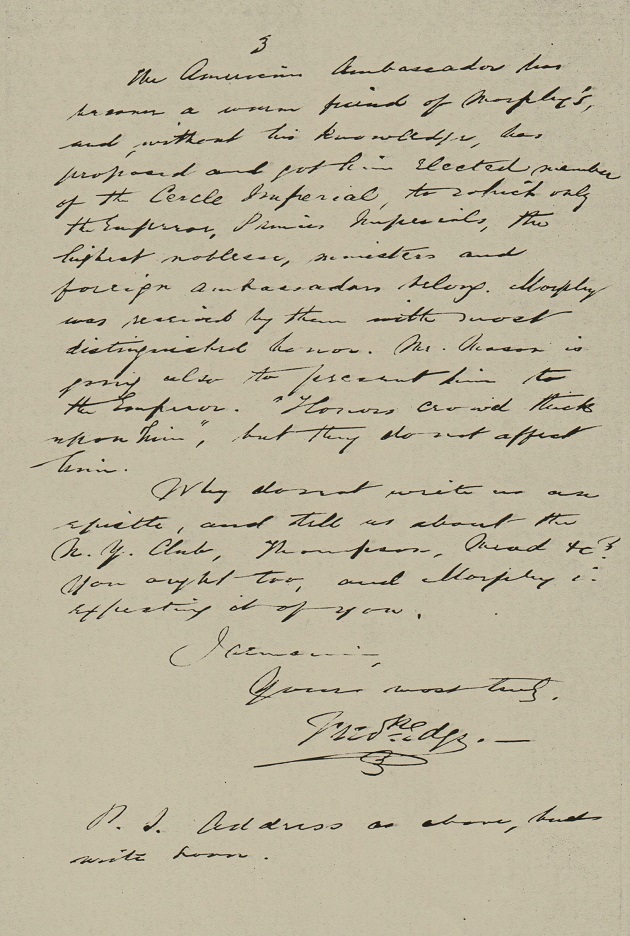
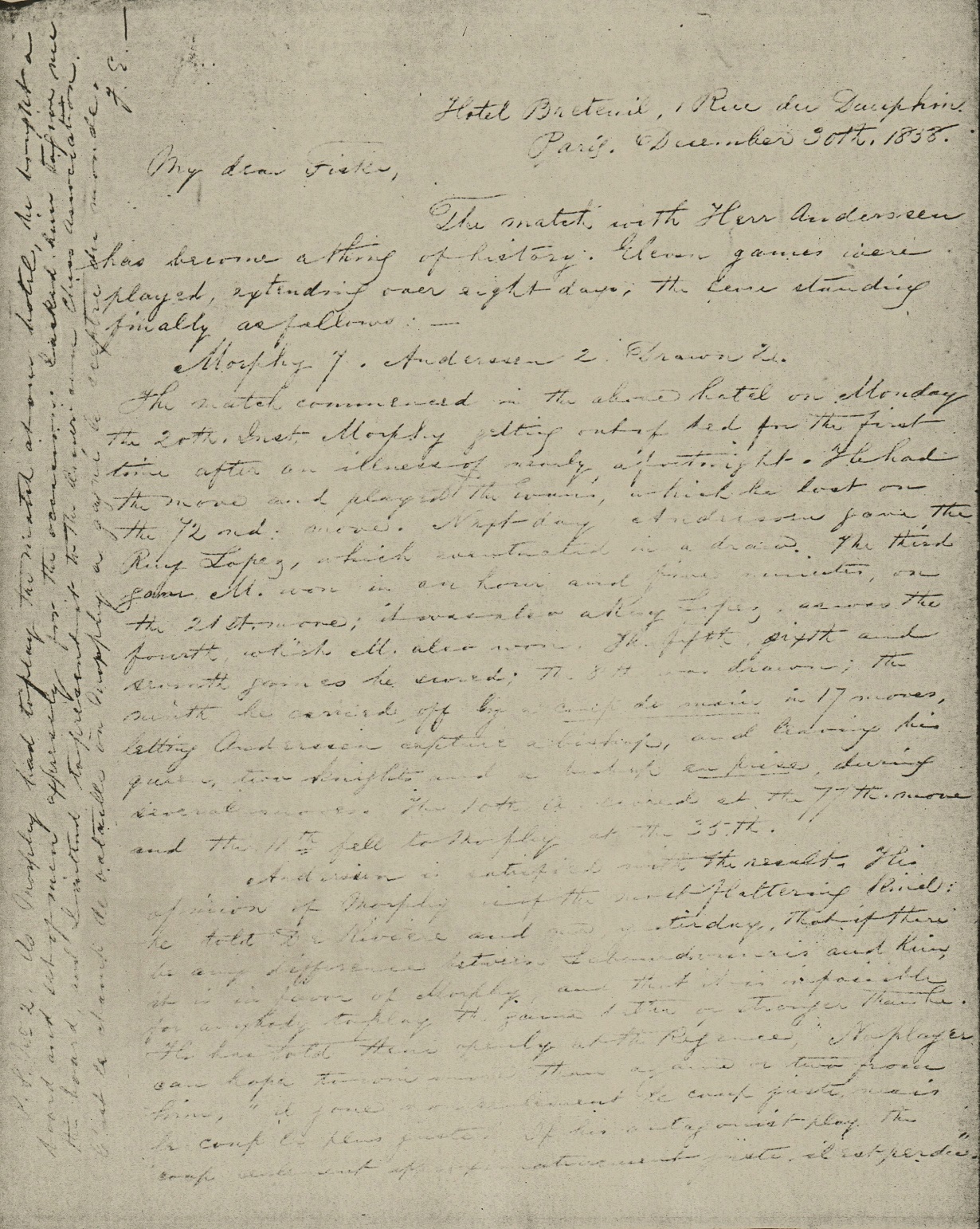
The second page is illegible.
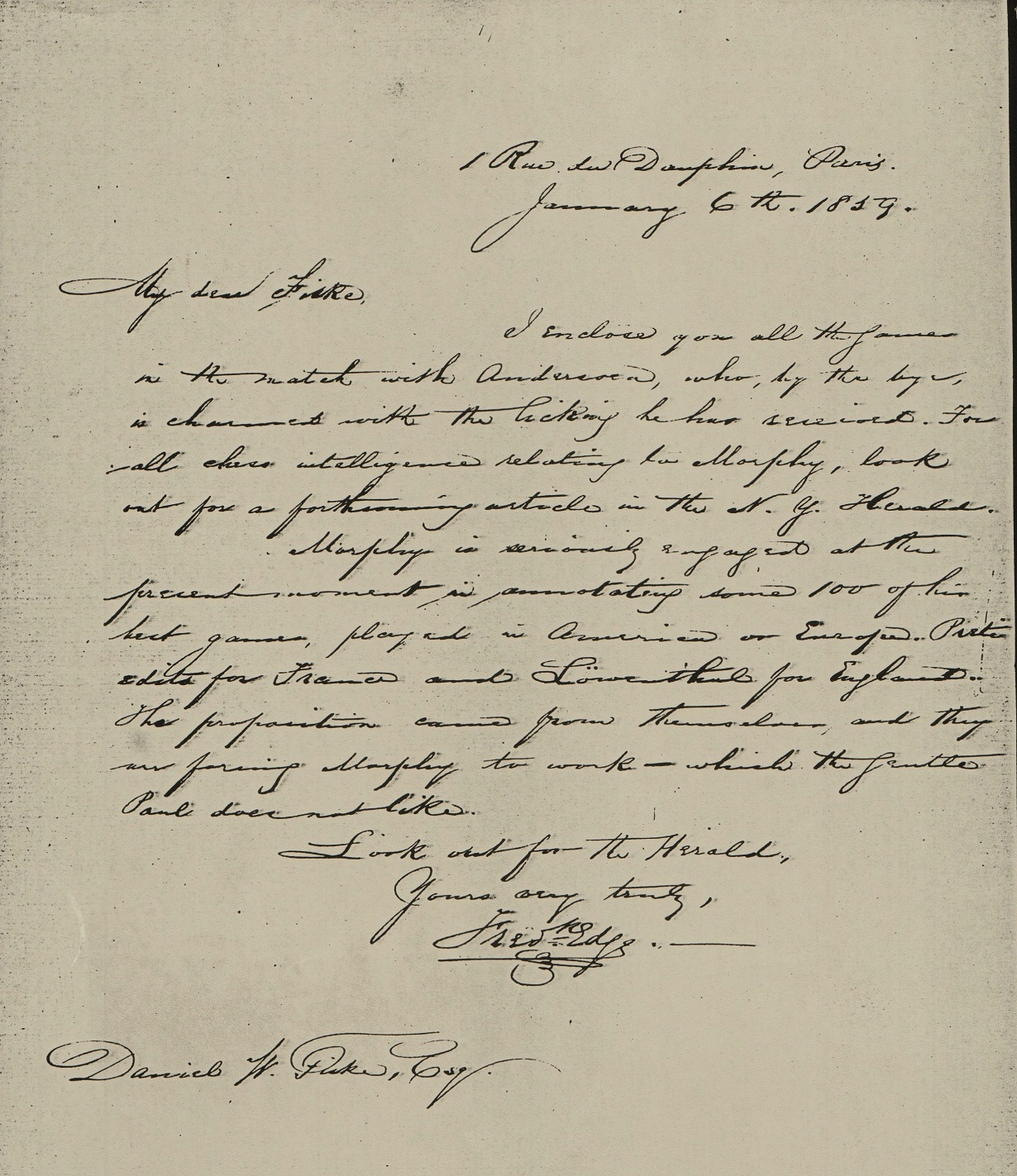
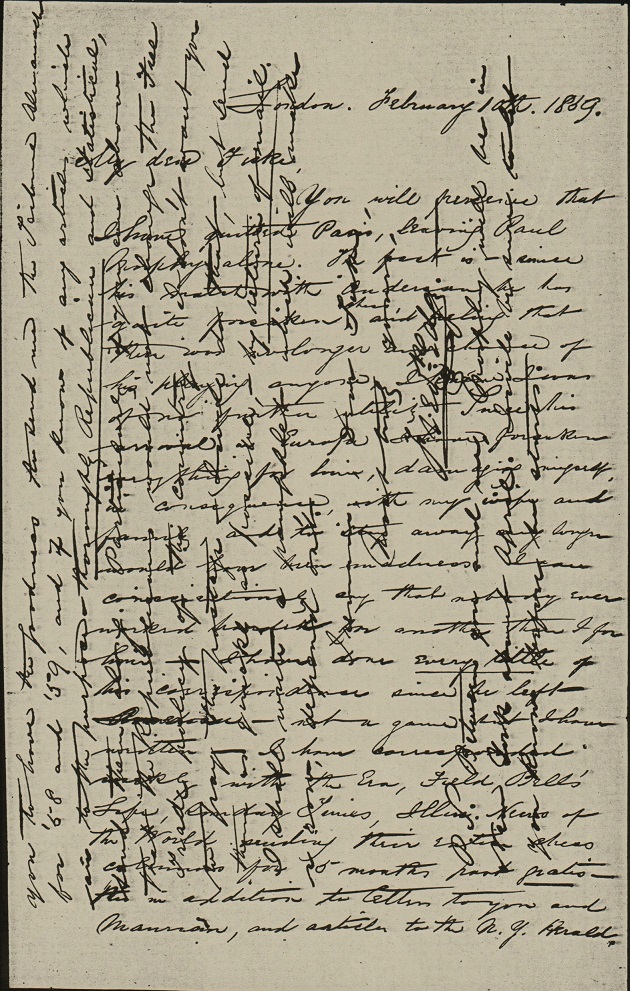
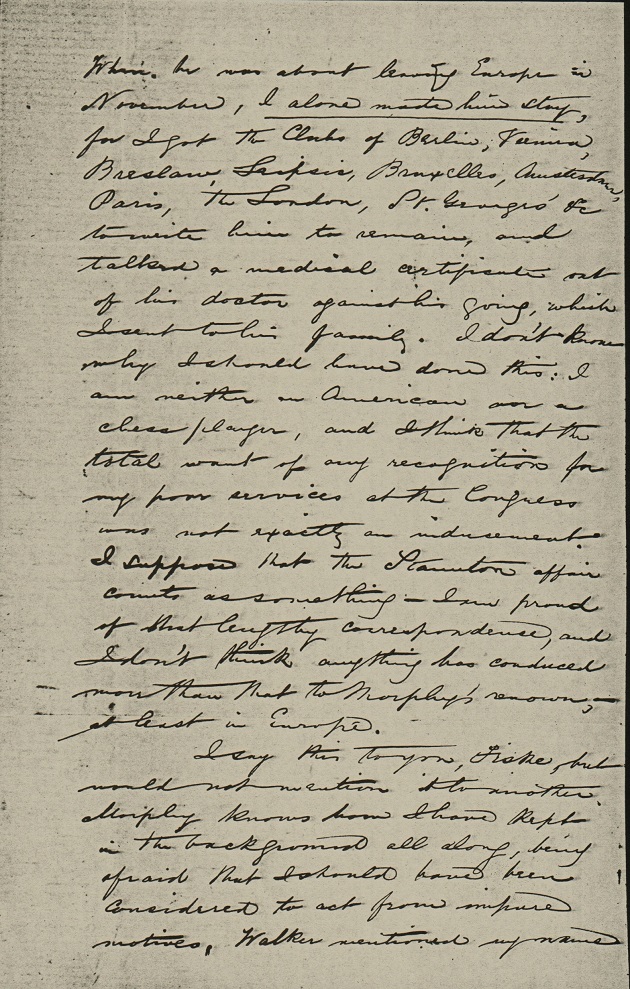
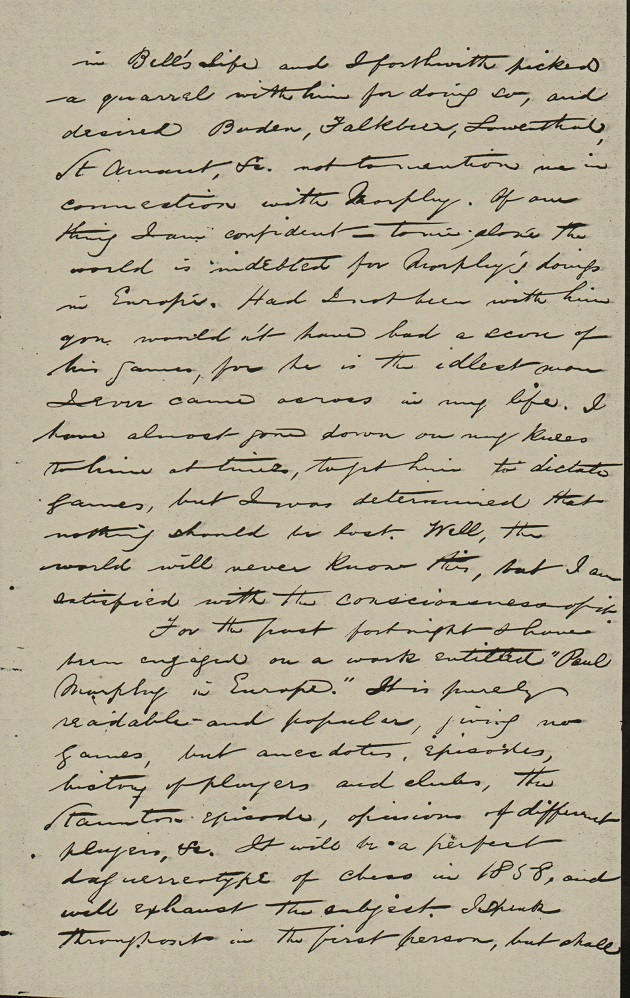
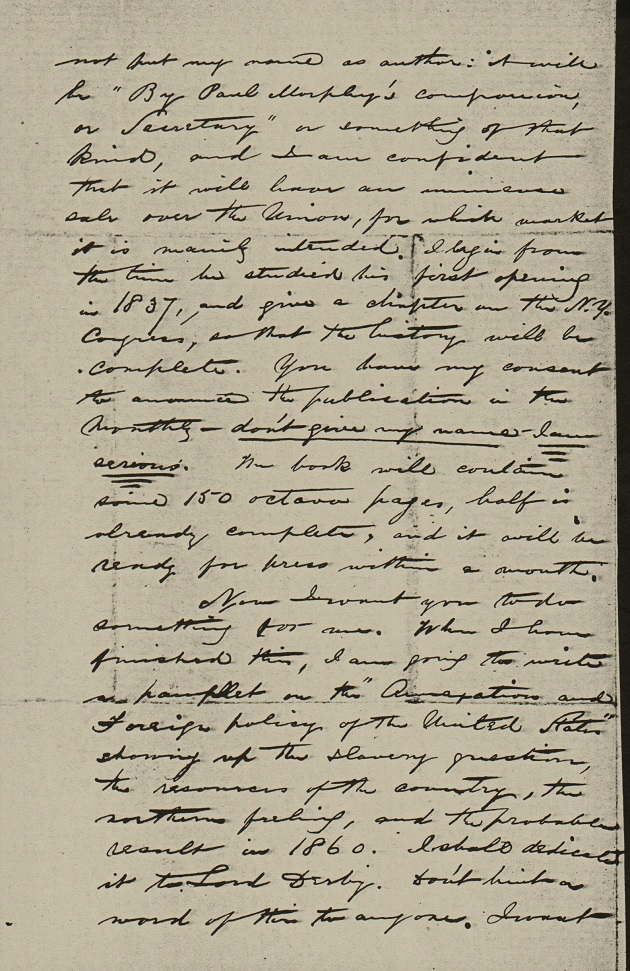
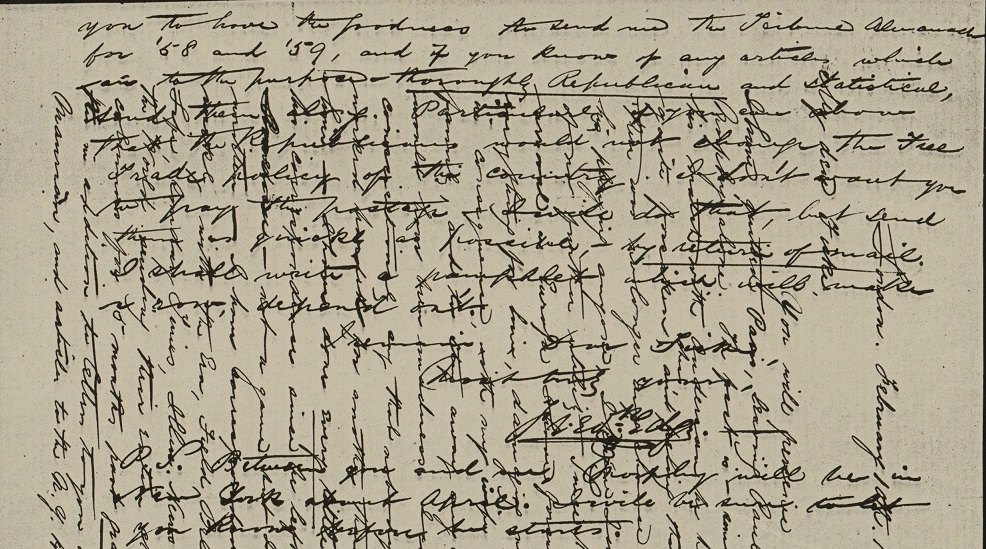
Some extracts from e-mail messages received from Dale Brandreth:
19 July 2000:
‘Now let me drop a real bombshell. I own about 40 pages of Edge letters in the original ... They are written on the thinnest paper imaginable, so that to make use of them I shall have to xerox them so as to not damage them.
Incidentally, Whyld has known for a long time that I have those Edge letters even though he has not seen the contents of more than the one you published. He knew through Hooper that I bought the Lawson collection in 1978 and Hooper knew that Lawson had those letters, so I never had to tell him that I owned them. Conceivably Lawson could have withheld them, though he did not, so Whyld did not know for certain until we discussed it ...’
23 July 2000:
‘Many, if not most, were written on two sides of very thin paper, so that while reading the originals is not so bad, reading one side of a copy with a lot of “show-through” is considerably more difficult. ... They were in the Lawson collection, but I know nothing more of their provenance. ... I doubt that Lawson ever really digested them. By the time I knew Lawson in person he was in his mid-70s and he was not all that sharp. He was certainly no great intellect, as I saw right away when he told me his theory about insects taking over the earth. He had them expanding their numbers linearly, never once seeing that there were limitations based on fatal interactions with other insects, disease, finite amounts of food and vegetation, etc. His book on Morphy almost did not get published at all because his text had to be re-written so much that the publisher became disgruntled and he became imperious that anyone could question his words. He told me that himself.
Lawson idolized Morphy to the point that I doubt that he would ever write anything about him that he saw as detrimental. Even though I think Staunton treated him badly in not agreeing to play a match with him – for obvious reasons that he knew he would lose badly – Morphy had little humility and probably made it difficult for Staunton to accept him since he was so much younger and received so much fawning praise.’
15 November 2000:
‘On the Edge letters: ... An interesting booklet could surely be based on them and it would add far more than the many speculations and innuendos which have abounded (example, the “lover” bit which was evidently started by Whyld long ago and from which I think he backed down when it became apparent in full context that it had nothing to do with homosexuality) based on the chess world not seeing them.’
See also Reliability Eroded (Kenneth Whyld).
Below is an extract from a letter dated 14 March 1901 from D.W. Fiske to John G. White:
‘I am a victim of chronic gout, which often drives me to my bed, where I divert myself by considering whether or not I shall write down my recollections of Morphy. As yet he is hardly appreciated by the chess world. Few people know, for instance, that a large part of the annotations to the games during his connection with the Chess Monthly were written by him. They seem to me to be models, not only of conciseness, but of clearness also, and they are certainly characterized by that which he never lost, a gentleman’s feeling towards all other players. He revised the sketch of himself in the Book of the First Chess Congress and selected the games for it. My memories of him are of the pleasantest.’
Source: pages xii-xiii of the posthumous collection of Fiske’s writings, Chess Tales & Chess Miscellanies (New York, 1912).
(3204)
A separate feature article presents extensive background information on F.M. Edge and his relations with Morphy and Staunton. See too A Debate on Staunton, Morphy and Edge and Supplement to ‘A Debate on Staunton, Morphy and Edge’.
See also Daniel Willard Fiske.
To the Chess Notes main page.
To the Archives for other feature articles.
Copyright: Edward Winter. All rights reserved.